

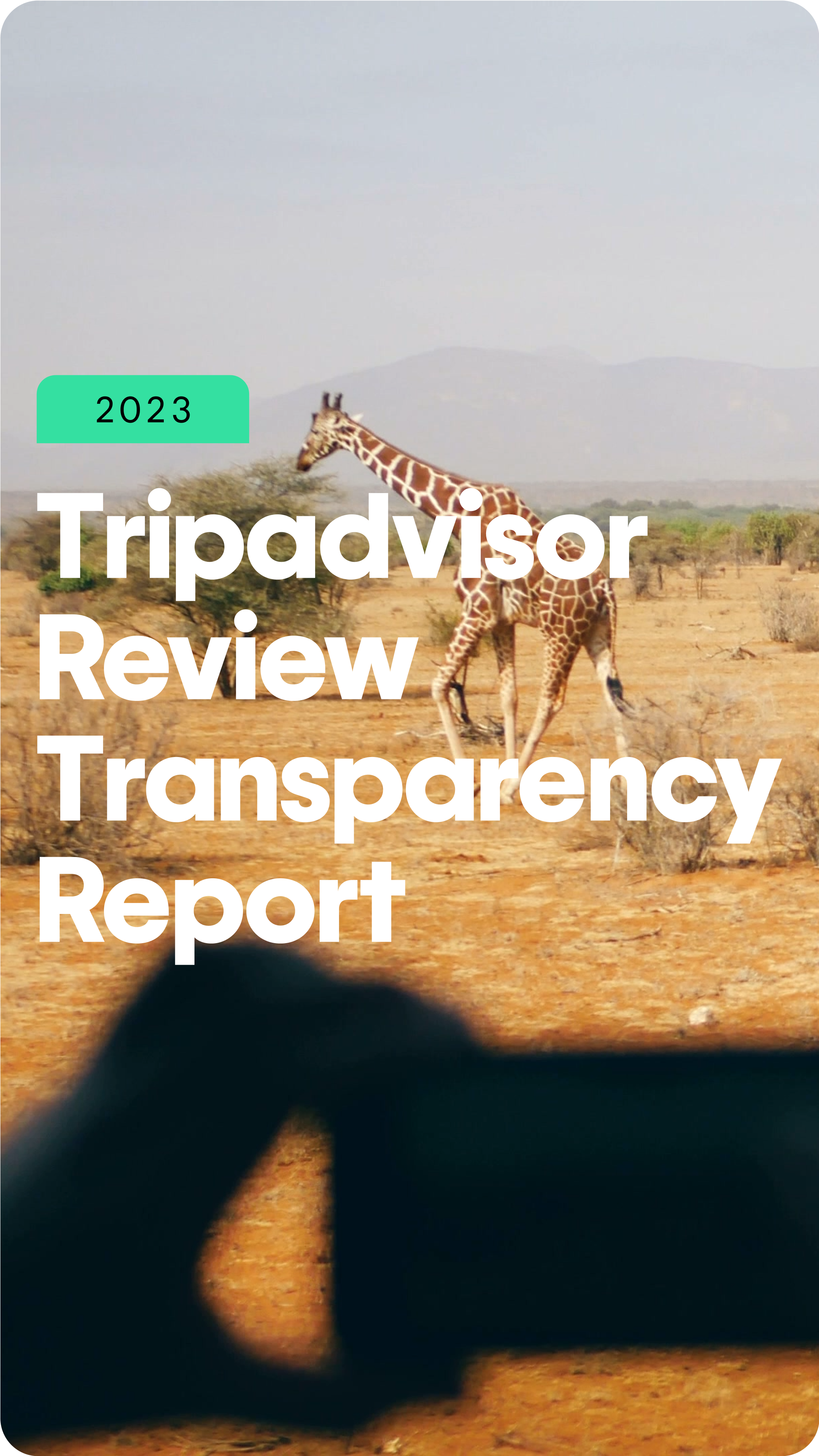
Foreword
We published our first Review Transparency Report in 2019 with a simple goal: to shine a light on Tripadvisor’s moderation practices and explain the processes that help ensure content on our platform is accurate, helpful, and safe for our community. This third edition, based on data from 2022, is published following an exciting time for the global travel industry.
After two years of lockdowns, quarantines, and restrictions, the world’s explorers returned in full force last year. Travelers and diners forged ahead with their plans, whether for leisure, business, or both, despite lingering restrictions from the COVID-19 pandemic in many parts of the world. In fact, consumer demand was unprecedented in many markets, even breaking records, with U.S. consumer travel spending for airfare and hotels surpassing 2019 levels earlier than predicted (source: Phocuswright). It was also a year of contrasts, as demand exceeded supply in many cases, testing consumers’ resolve.
Against this backdrop, reliance on trusted guidance increased, as travelers and diners focused more than ever on getting the most out of every trip, meal, and experience. And as demand accelerated during the year, so did the reviews, pictures, comments, and content that make Tripadvisor an indispensable guide to experiences and decision-making.
This report analyzes a full year’s worth of guidance data from our platform, revealing the behavior of Tripadvisor’s community and its impact on review contributions as the travel and leisure sector returned to growth. It also pulls back the curtain on the actions we have taken to keep Tripadvisor fair, safe, and trustworthy for the millions of consumers and businesses that use the platform every single day.
Ultimately, this report is about recognizing the importance of trust for platforms like Tripadvisor. We understand that trust is earned, not given, and by shining a light on the data and processes behind our platform, we hope to demonstrate why the trust our community has in us is not misplaced.


Foreword
We published our first Review Transparency Report in 2019 with a simple goal: to shine a light on Tripadvisor’s moderation practices and explain the processes that help ensure content on our platform is accurate, helpful, and safe for our community. This third edition, based on data from 2022, is published following an exciting time for the global travel industry.
After two years of lockdowns, quarantines, and restrictions, the world’s explorers returned in full force last year. Travelers and diners forged ahead with their plans, whether for leisure, business, or both, despite lingering restrictions from the COVID-19 pandemic in many parts of the world. In fact, consumer demand was unprecedented in many markets, even breaking records, with U.S. consumer travel spending for airfare and hotels surpassing 2019 levels earlier than predicted (source: Phocuswright). It was also a year of contrasts, as demand exceeded supply in many cases, testing consumers’ resolve.
Against this backdrop, reliance on trusted guidance increased, as travelers and diners focused more than ever on getting the most out of every trip, meal, and experience. And as demand accelerated during the year, so did the reviews, pictures, comments, and content that make Tripadvisor an indispensable guide to experiences and decision-making.
This report analyzes a full year’s worth of guidance data from our platform, revealing the behavior of Tripadvisor’s community and its impact on review contributions as the travel and leisure sector returned to growth. It also pulls back the curtain on the actions we have taken to keep Tripadvisor fair, safe, and trustworthy for the millions of consumers and businesses that use the platform every single day.
Ultimately, this report is about recognizing the importance of trust for platforms like Tripadvisor. We understand that trust is earned, not given, and by shining a light on the data and processes behind our platform, we hope to demonstrate why the trust our community has in us is not misplaced.
Executive Summary
This report analyzes a full year’s worth of community contributions—over 76 million reviews and opinions in total—giving readers a deep dive into global submissions and revealing how review trends shifted during a period of rapid growth for the tourism sector.
It provides details around the stages involved in screening and posting the user-generated content that helps make Tripadvisor such a unique resource for travelers and diners. This includes information on the platform’s community standards and our efforts to combat fake and harmful content.
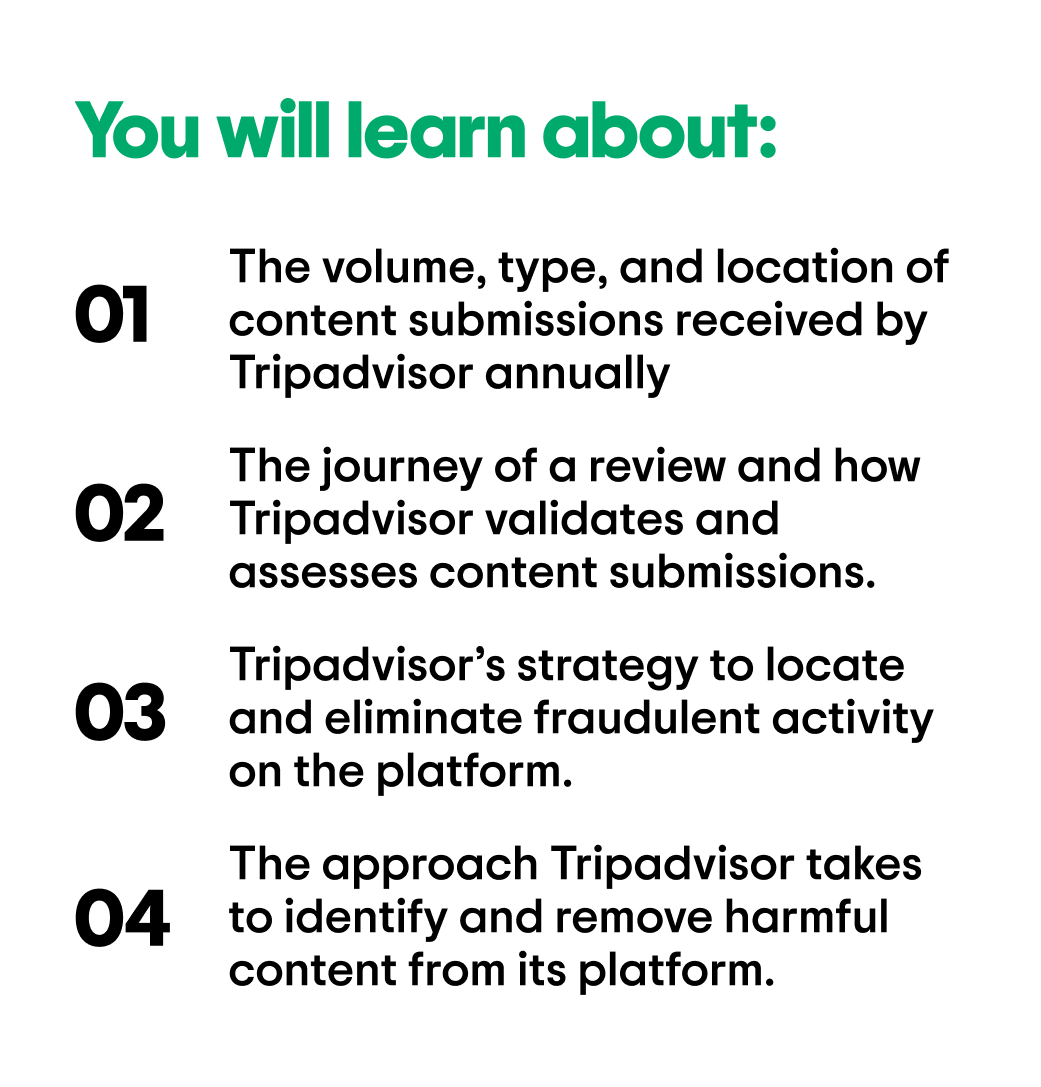
More than 30.2 million reviews were posted by 17.4 million Tripadvisor members.

Around 2.3 million review submissions were manually reviewed by a human moderator to determine if they should be posted to the site.
1.3 million reviews were identified as fake and removed, with 72% of these caught before ever being posted.
Reviews that reveal a serious safety issue are 10 times more likely to be clicked on than typical reviews
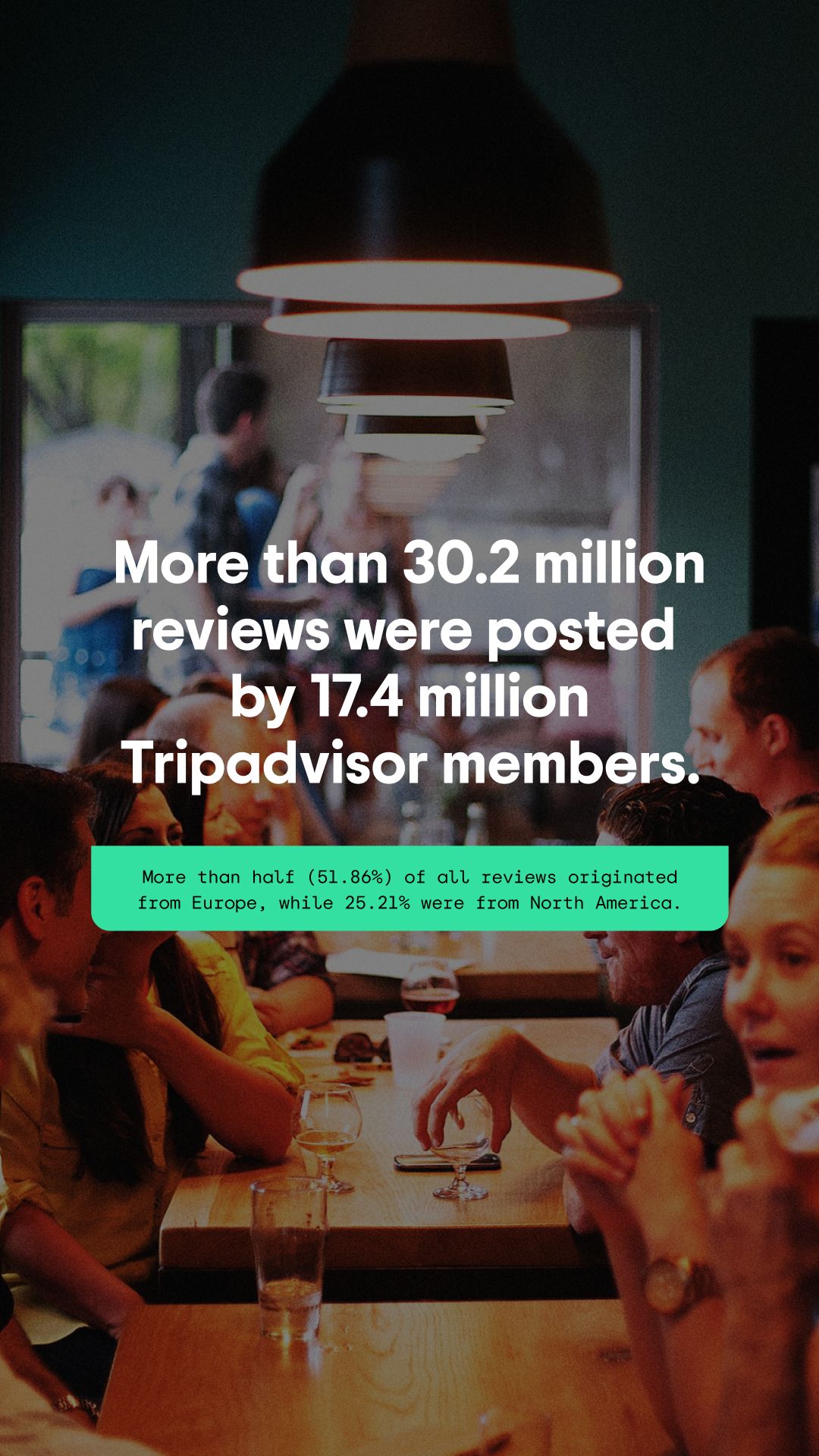
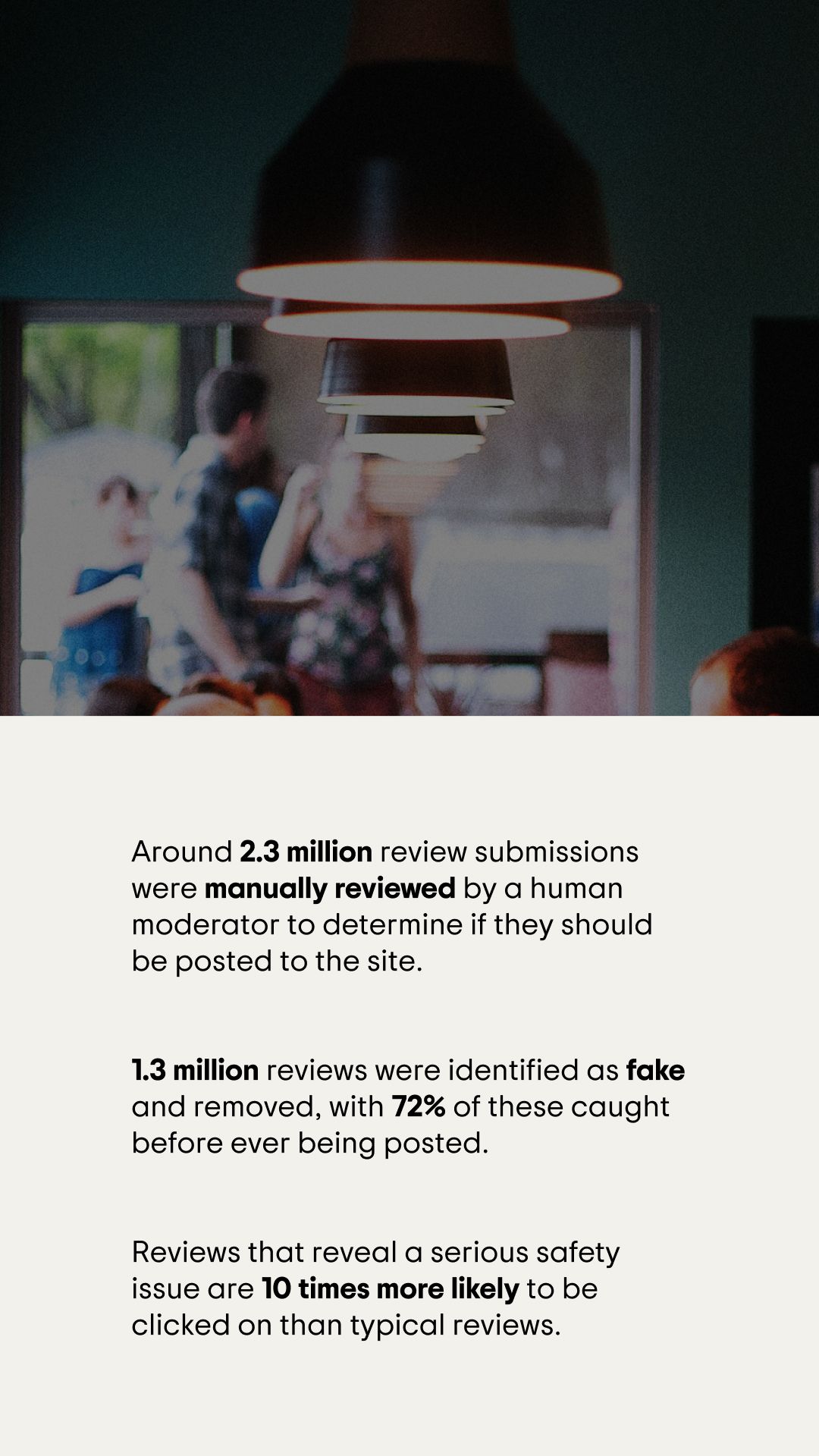
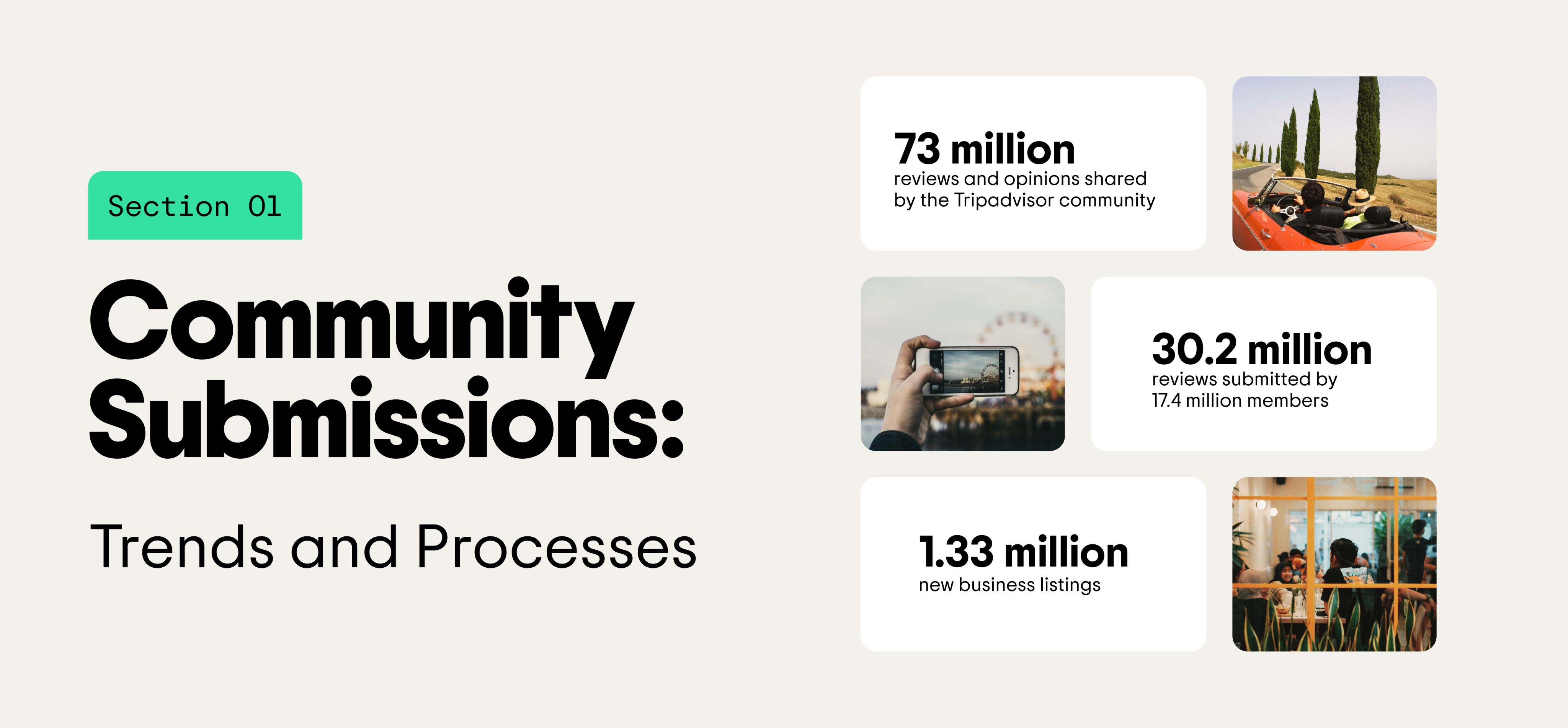
Tripadvisor is the world’s largest travel guidance platform based on user-generated content (UGC) and shared experiences. Millions of journeys start here as travelers turn to Tripadvisor to consume reviews and posts from fellow travelers and diners to guide their decision-making and validate their choices. Whether for stays, restaurants, attractions, destinations, or any other travel-related encounter, Tripadvisor is a universal and dependable resource around the globe.
In 2022 alone, more than 73 million reviews and opinions were submitted to the platform by 23 million members. This included 30.2 million reviews and 31.6 million photos and videos shared by the Tripadvisor community. Owners responded to 10 million reviews, and community members asked and answered more than 940,000 questions from fellow users. In addition to reviews and opinions, forum posts surpassed 3.8 million.
Just the Facts, 2022


Number of Reviews by Month, 2022

Review Content and Tone
A year of recovery brought new challenges for the hospitality sector. Following hundreds of thousands of resignations and layoffs, many businesses found themselves short-staffed just when travel demand was peaking. Hotels around the globe were forced to scale back offerings, such as daily housekeeping or food service, with many hotel restaurants struggling to recruit chefs or servers. Restaurants also struggled with supply chain and staffing issues, causing many to reduce hours or menu items.
Travelers in 2022 had stronger feelings, both negative and positive, than previous report years. The average rating rose to 4.34 bubbles out of 5. More than 70% of reviews were 5 bubbles, up from 66% in 2020, and 57% in 2018, indicating that travelers recognize the value of their experiences and appreciate the efforts businesses make, especially during difficult times. Conversely, when a traveler had a negative experience, they were more likely to rate it lower, with 7.9% of submitted reviews awarded a 1-bubble rating, up from 7.2% in 2020.
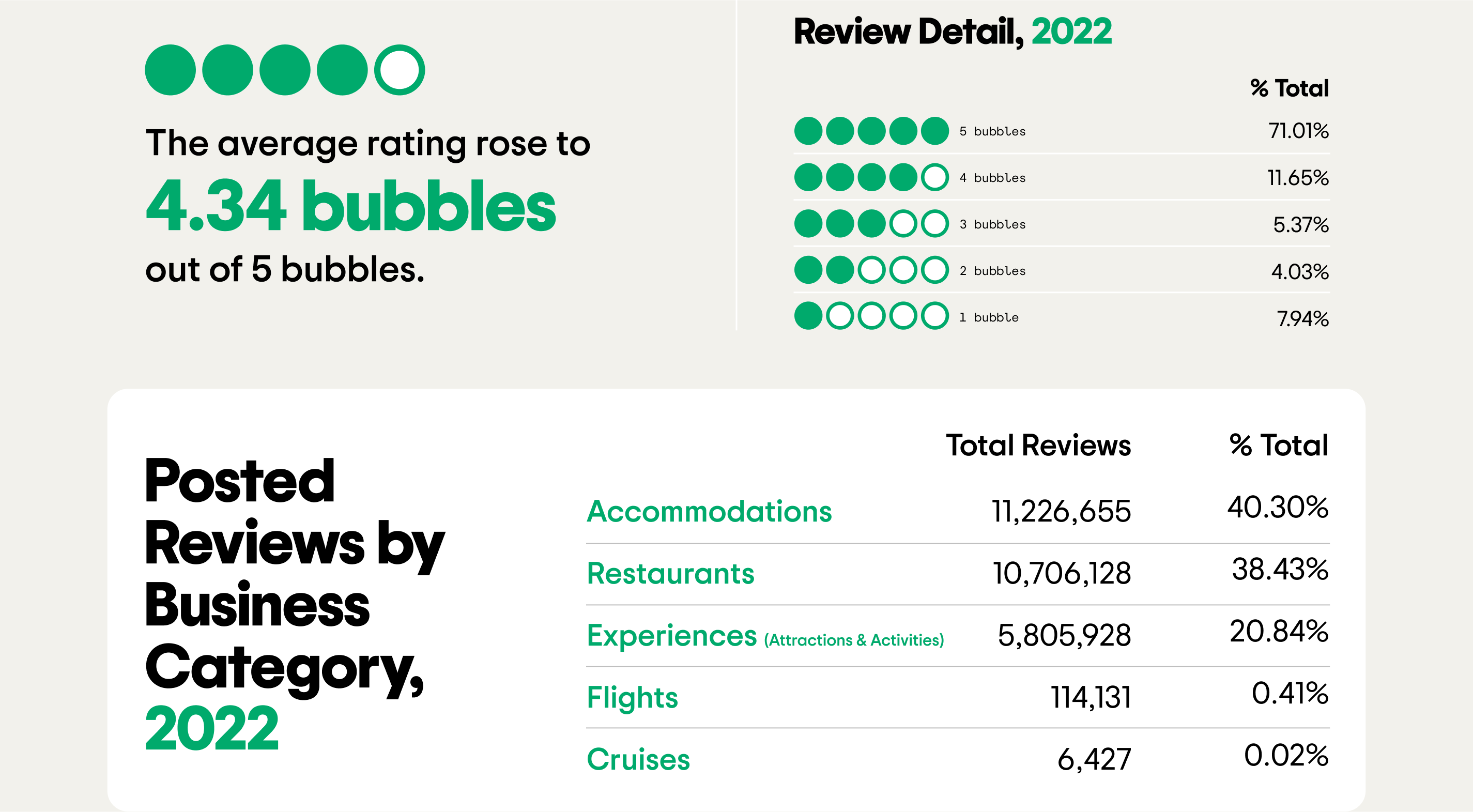
Businesses Listed on Tripadvisor
As the world continued to recover, we saw an influx of new listings created on Tripadvisor, with 1.33 million new businesses added to the site in 2022, leading to a record 11.1 million listings at year end. That compared to 8.7 million total business listings in 2018 and 9.6 million in 2020.
Total Business Listings on Site at Year End

Looking at regional trends, two out of five newly listed businesses were located in Europe, while Asia and North America each accounted for about 23% of the total. While listings rose in nearly all regions in 2022 compared to 2020, the greatest gains came from Africa, where listings rose 59.14% in two years, followed by the Middle East, up 48.17% in the same period.
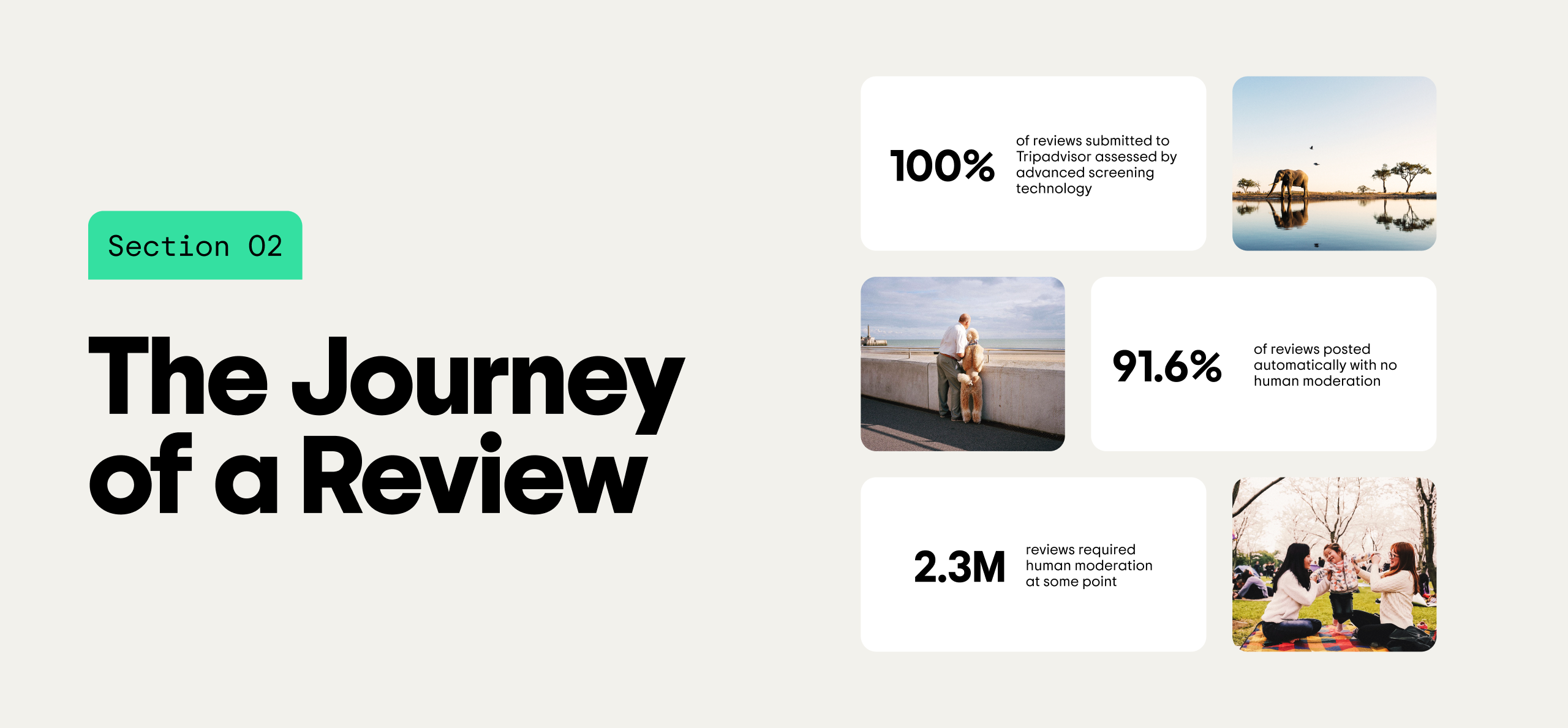
With millions of travelers and diners relying on Tripadvisor, it is critical to ensure that every piece of content submitted to the platform—whether a review, photo, comment, or business response—complies with community standards.
All user-submitted content must adhere to Tripadvisor’s Community Guidelines. Each and every review submitted to Tripadvisor is assessed by our review processing system that has been built and refined over the past 22 years, containing hundreds of filters to help identify content violations.
A Thorough 3-Step Process
Tripadvisor has a three-part system for screening reviews to ensure they meet community standards.
Upon submission there are two methods—manual and automated—as humans and machines work together to assess the validity and suitability of each post. While the automated process does most of the work, the manual process is sometimes required to make final decisions based on additional information and possible follow-up with reviewers.
Once screened, the vast majority of review submissions are cleared to be posted, but some are immediately rejected, while others are flagged for deeper assessment by Tripadvisor’s team of content moderators. These content moderators work 24 hours a day, seven days a week, in 28 languages to inspect content flagged by the automated system, usually for suspicion of being fake or offensive or for other reasons described in Section Three.
Automated Moderation
The percent of reviews processed automatically (through automated processing with no human intervention) remained flat from 2020, at 91.6%. Of the 8.4% that were not automatically posted, 3.7% were auto-removed while 4.7% required human moderation at the point of submission.
Human Moderation
The total number of submissions that required human moderation at point of submission was 1.4 million (or 4.7%) in 2022, up from 1.3 million in 2020. In total, 2.3 million reviews (or 7.7% of all reviews) were moderated by a human - this includes either before posting or after posting.
Review Rejection Journey
Among all reviews moderated by a human, 40.35% were ultimately removed. A review is put in front of a human moderator when Tripadvisor’s advanced screening technology can neither entirely reject or entirely clear it to be posted. This is where our team of experts steps in and assesses the submission in its entirety through a process that can only be performed by a trained human being to determine whether the content in question meets our community guidelines.





With millions of travelers and diners relying on Tripadvisor, it is critical to ensure that every piece of content submitted to the platform—whether a review, photo, comment, or business response—complies with community standards.
All user-submitted content must adhere to Tripadvisor’s Community Guidelines. Each and every review submitted to Tripadvisor is assessed by our review processing system that has been built and refined over the past 22 years, containing hundreds of filters to help identify content violations.
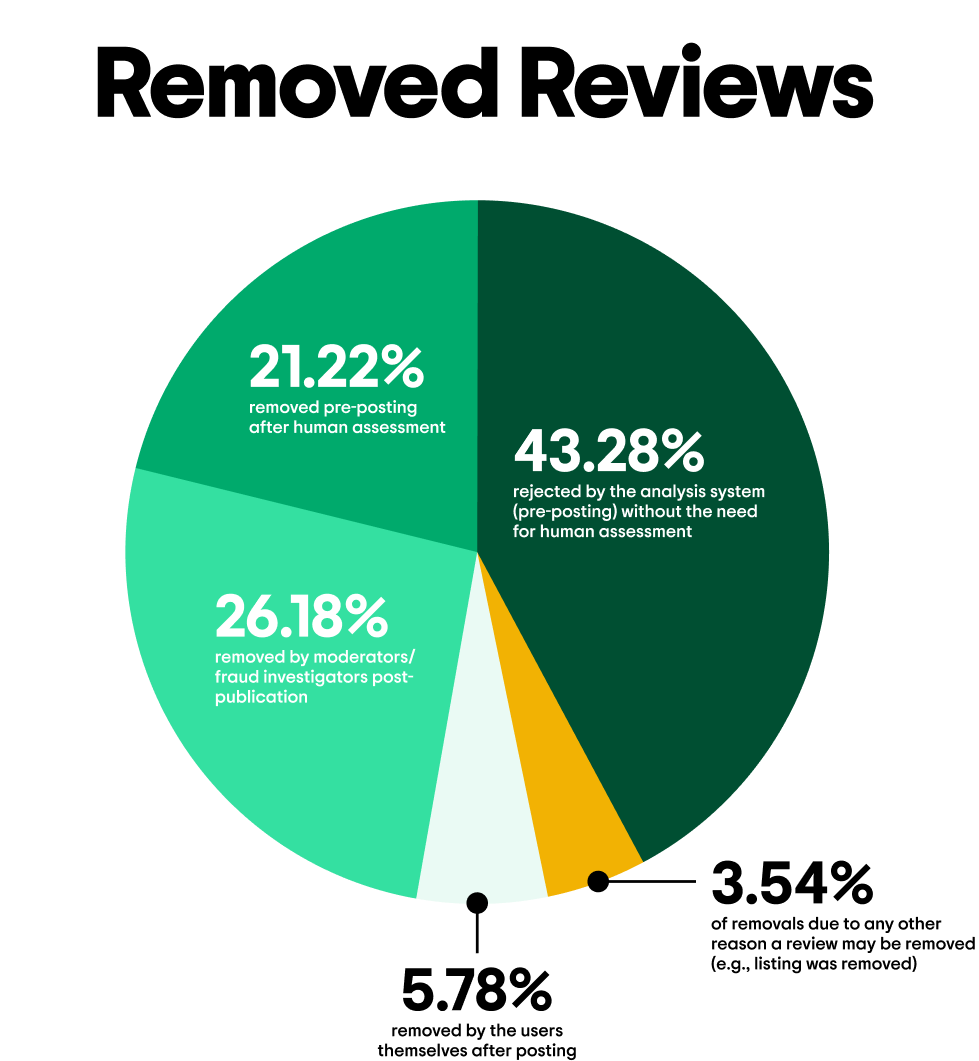
A Thorough 3-Step Process
Tripadvisor has a three-part system for screening reviews to ensure they meet community standards.
Upon submission there are two methods—manual and automated—as humans and machines work together to assess the validity and suitability of each post. While the automated process does most of the work, the manual process is sometimes required to make final decisions based on additional information and possible follow-up with reviewers.
Once screened, the vast majority of review submissions are cleared to be posted, but some are immediately rejected, while others are flagged for deeper assessment by Tripadvisor’s team of content moderators. These content moderators work 24 hours a day, seven days a week, in 28 languages to inspect content flagged by the automated system, usually for suspicion of being fake or offensive or for other reasons described in Section Three.
Automated Moderation
The percent of reviews processed automatically (through automated processing with no human intervention) remained flat from 2020, at 91.6%. Of the 8.4% that were not automatically posted, 3.7% were auto-removed while 4.7% required human moderation at the point of submission.
Human Moderation
The total number of submissions that required human moderation at point of submission was 1.4 million (or 4.7%) in 2022, up from 1.3 million in 2020. In total, 2.3 million reviews (or 7.7% of all reviews) were moderated by a human - this includes either before posting or after posting.
Review Rejection Journey
Among all reviews moderated by a human, 40.35% were ultimately removed. A review is put in front of a human moderator when Tripadvisor’s advanced screening technology can neither entirely reject or entirely clear it to be posted. This is where our team of experts steps in and assesses the submission in its entirety through a process that can only be performed by a trained human being to determine whether the content in question meets our community guidelines.
Contested Content
In addition to automatic and human moderation, there is a third and vital aspect to assessing reviews: the Tripadvisor community. Less than 1% of reviews are contested by our community of travelers and business owners. When content that violates Community Standards does make it onto the platform, the vigilance of the community helps Tripadvisor’s moderation teams identify and resolve each case.
Of what was flagged by the community, less than 10% of contested reviews ended up being removed for reasons related to fraud. The remainder were removed for violating other community guidelines.
Response Times for Contested Reviews
It is a top priority for Tripadvisor to ensure that reviews contested by our community are responded to quickly. This is the opportunity for us to correct potential mistakes our automation or human moderation missed the first time around. We know we’re not perfect, and we rely on our community to let us know when we may have gotten it wrong!
Contested Review Outcome

Response Time for Contested Reviews
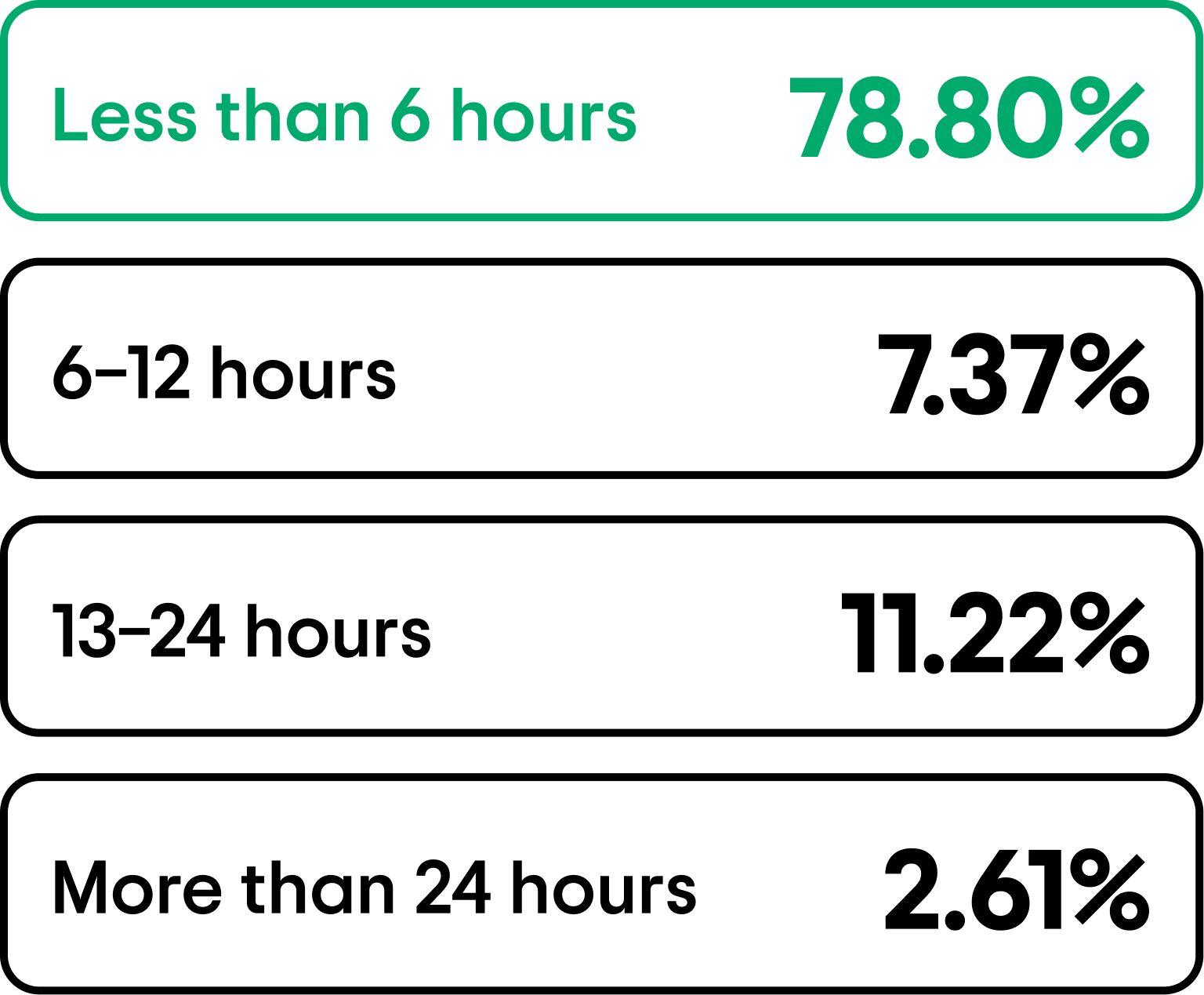
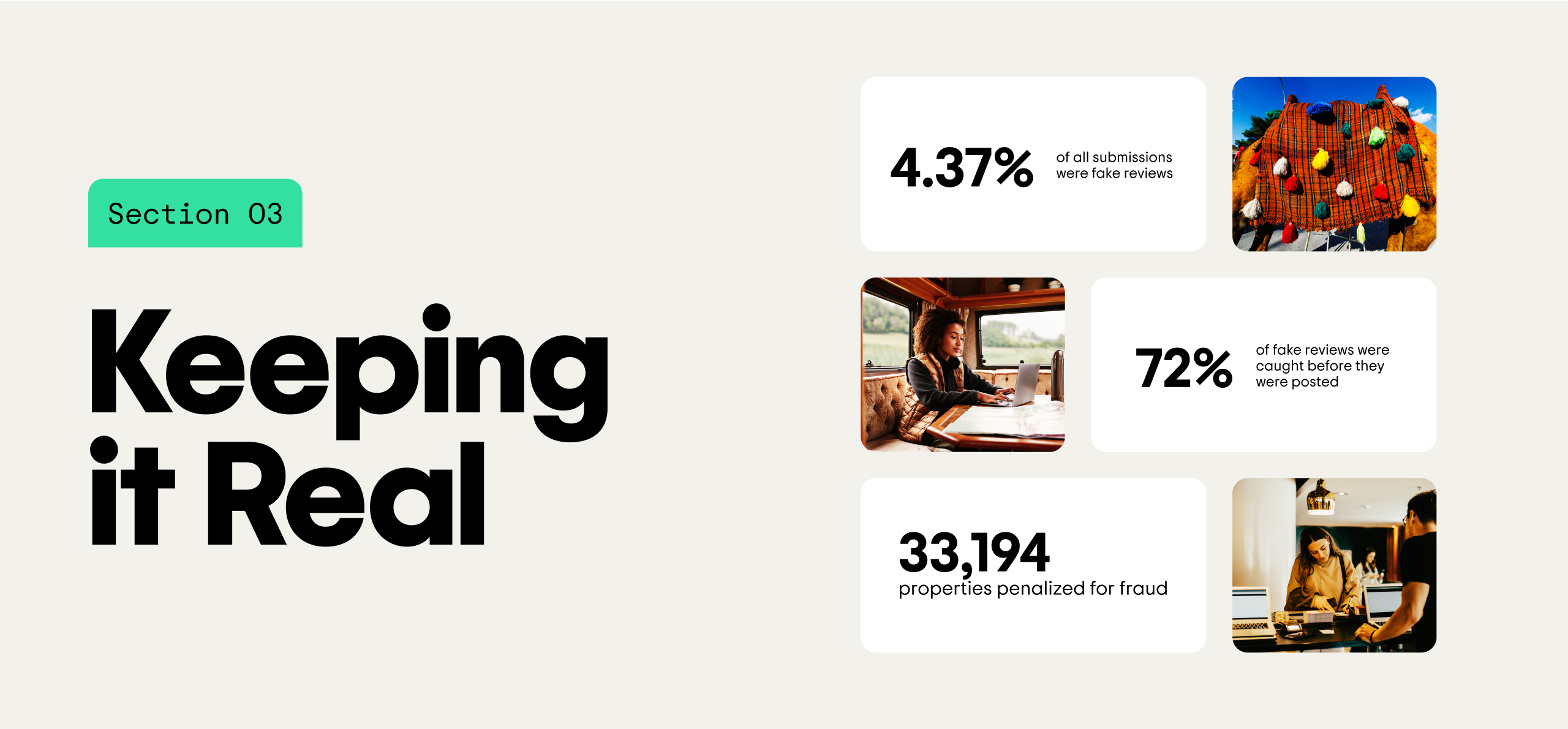
What Are Fake Reviews?
A fake review is one that has been submitted by someone who is either biased in some way and/or who did not have a personal experience with the business they reviewed. This includes, but is not limited to:
- Review boosting: when someone connected to the business such as an owner, employee, or family member posts a positive review.
- Review vandalism: when someone connected to a competing business submits a deliberately malicious review about a business to unfairly lower its ranking position or discredit it in some way.
- Paid reviews: when a business employs the services of an individual or a firm to boost its ranking position on Tripadvisor with positive reviews.
- Member fraud: when a user knowingly and/or maliciously submits a review in violation of our guidelines, potentially with the intent of affecting a property’s ranking, but does so independently and not influenced by a property listed on Tripadvisor.
Types of Fake Reviews
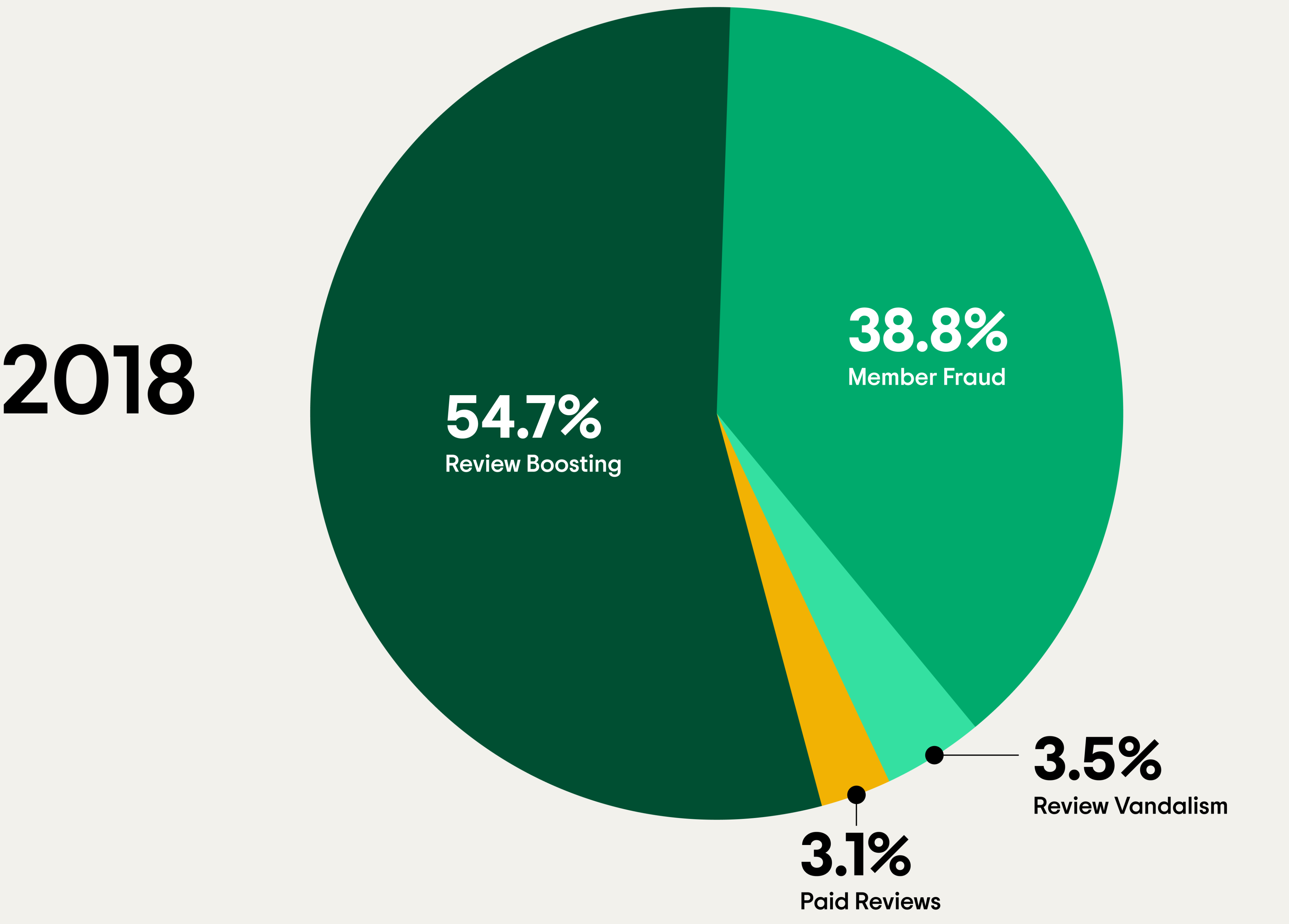
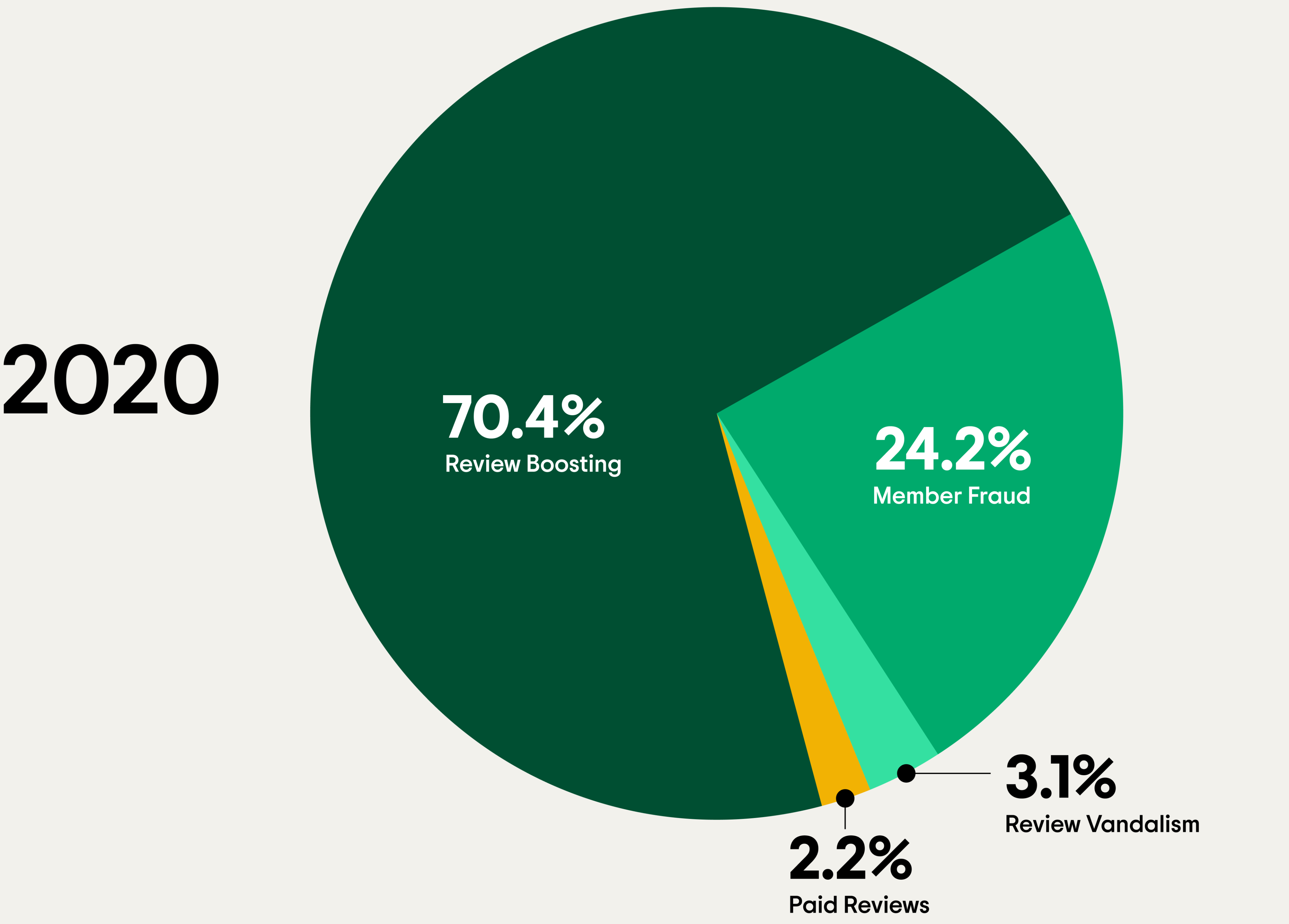
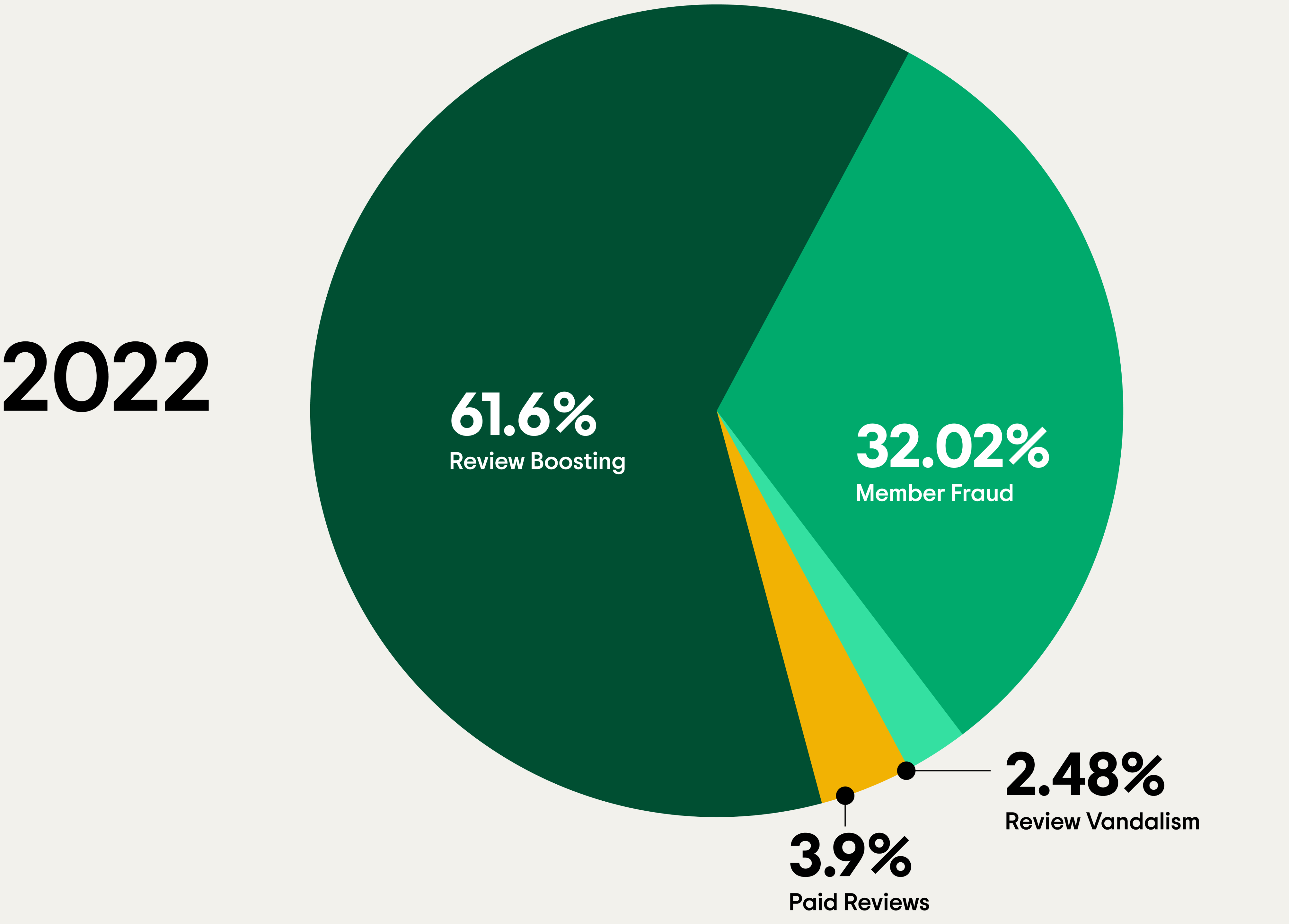
Spotting Fake or Paid Reviews
Staying ahead of paid reviews is serious business, and it’s necessary to support the vast majority of honest travelers, diners, and business owners on the platform. But when these reviews do infiltrate the system, Tripadvisor is ready to respond.
Due to a diligent, layered approach to moderation, the vast majority of fake reviews never make it to the platform. Tripadvisor’s fraud detection technology and expert investigative teams incorporate proactive techniques from the banking and credit card industry to map hundreds of discrete pieces of information, designed to detect the review’s origin and context or to spot a potential connection to other reviews or reviewer accounts. This includes establishing patterns of suspicious behavior from paid review operations as well.
Efforts to identify and eliminate fake reviews submitted to Tripadvisor continue to advance. In 2022, fake reviews represented 4.37% of all submissions versus 3.6% in 2020 and 2.4% in 2018. Luckily, more are caught early: 72% were caught before they were posted, compared to 67.1% in 2020. In total, 1.3 million reviews were identified as fake in 2022, compared to 943,000 in 2020.
Paid Reviews
While paid reviews represent a small percent of overall fraud removed, they continue to be a priority for Tripadvisor because they have the very real capability to negatively impact consumer trust. In total, the platform received 24,521 reviews associated with paid review companies in 2022. Nearly half of these originated from just six countries: India, Russia, U.S., Türkiye, Italy, and Vietnam.
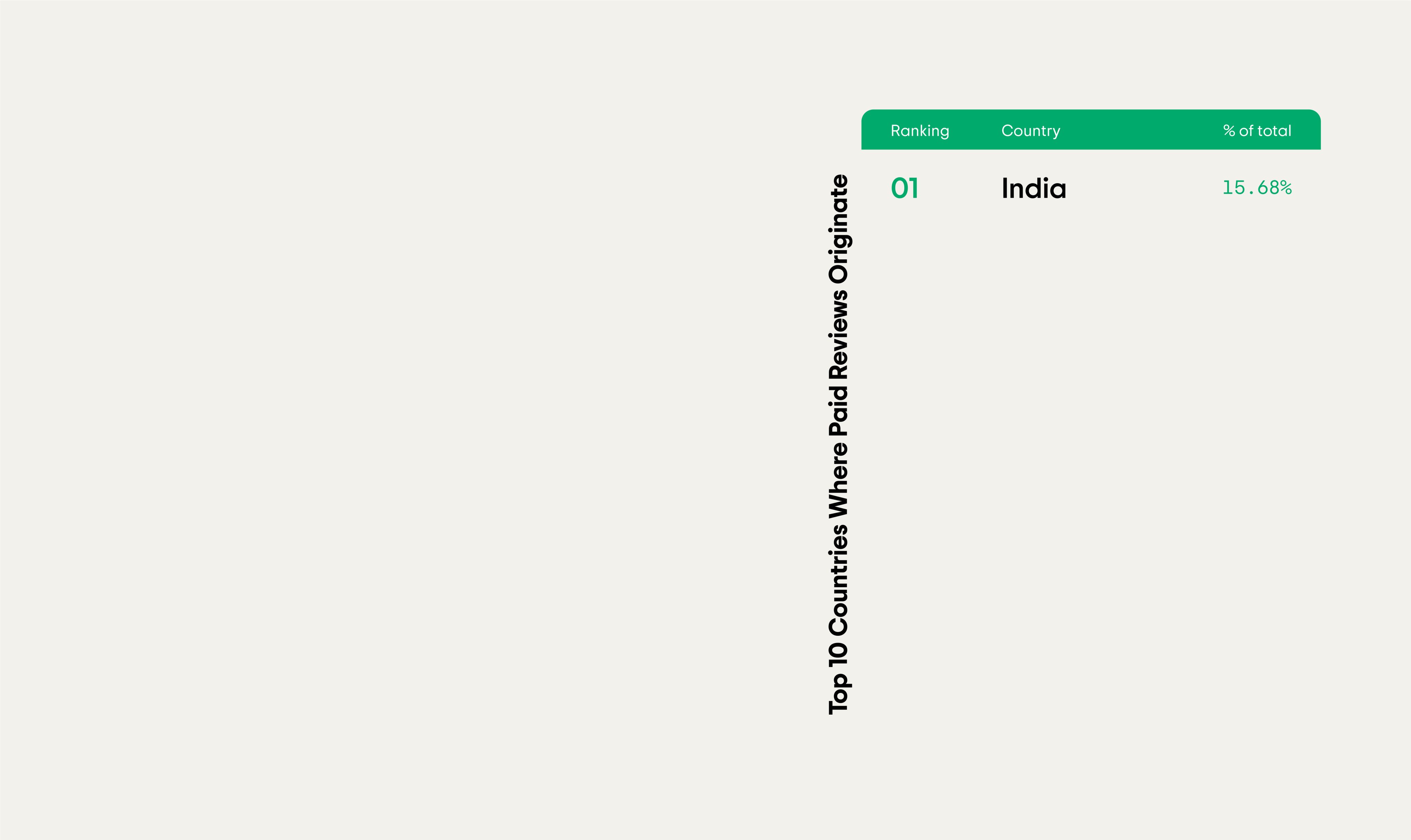
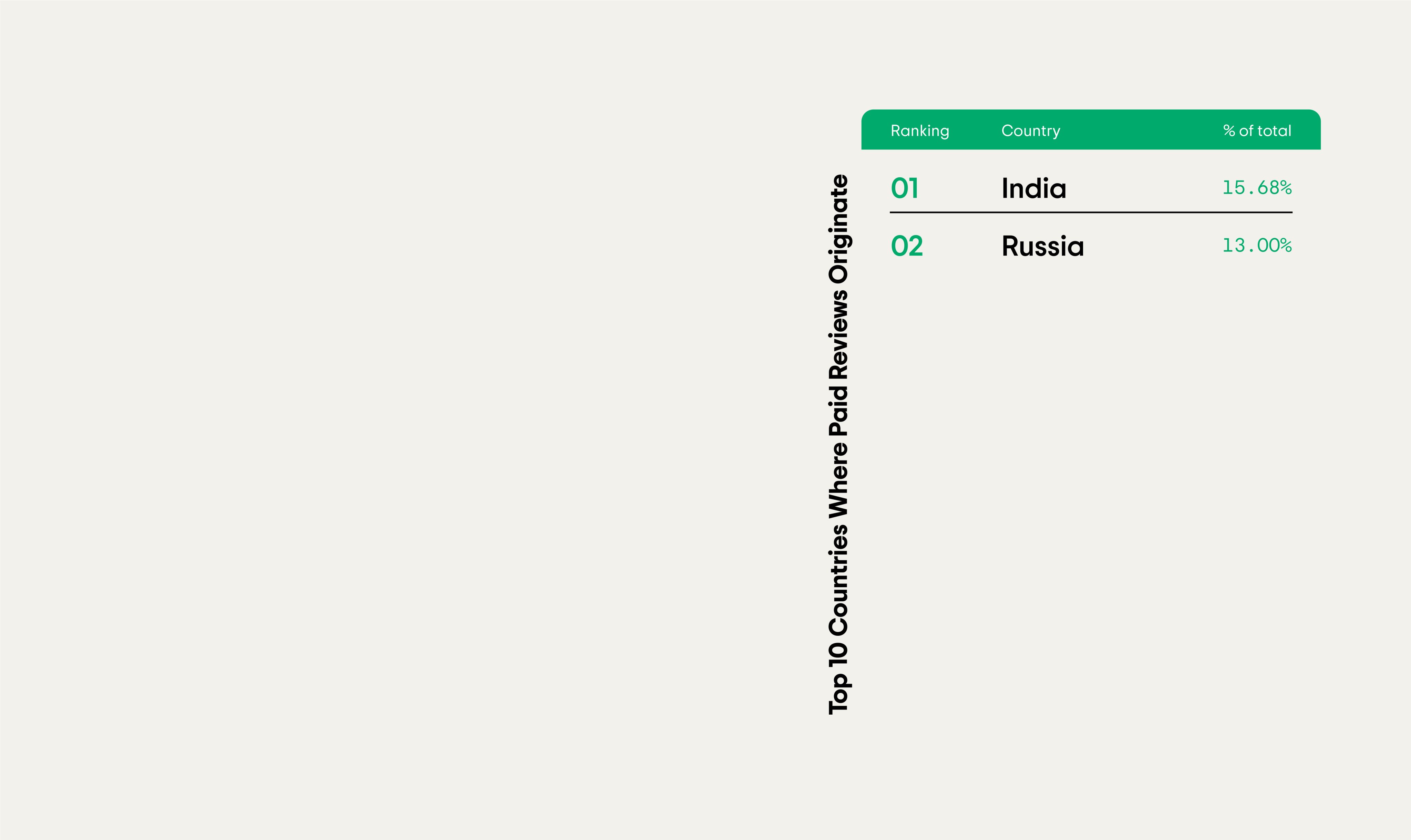
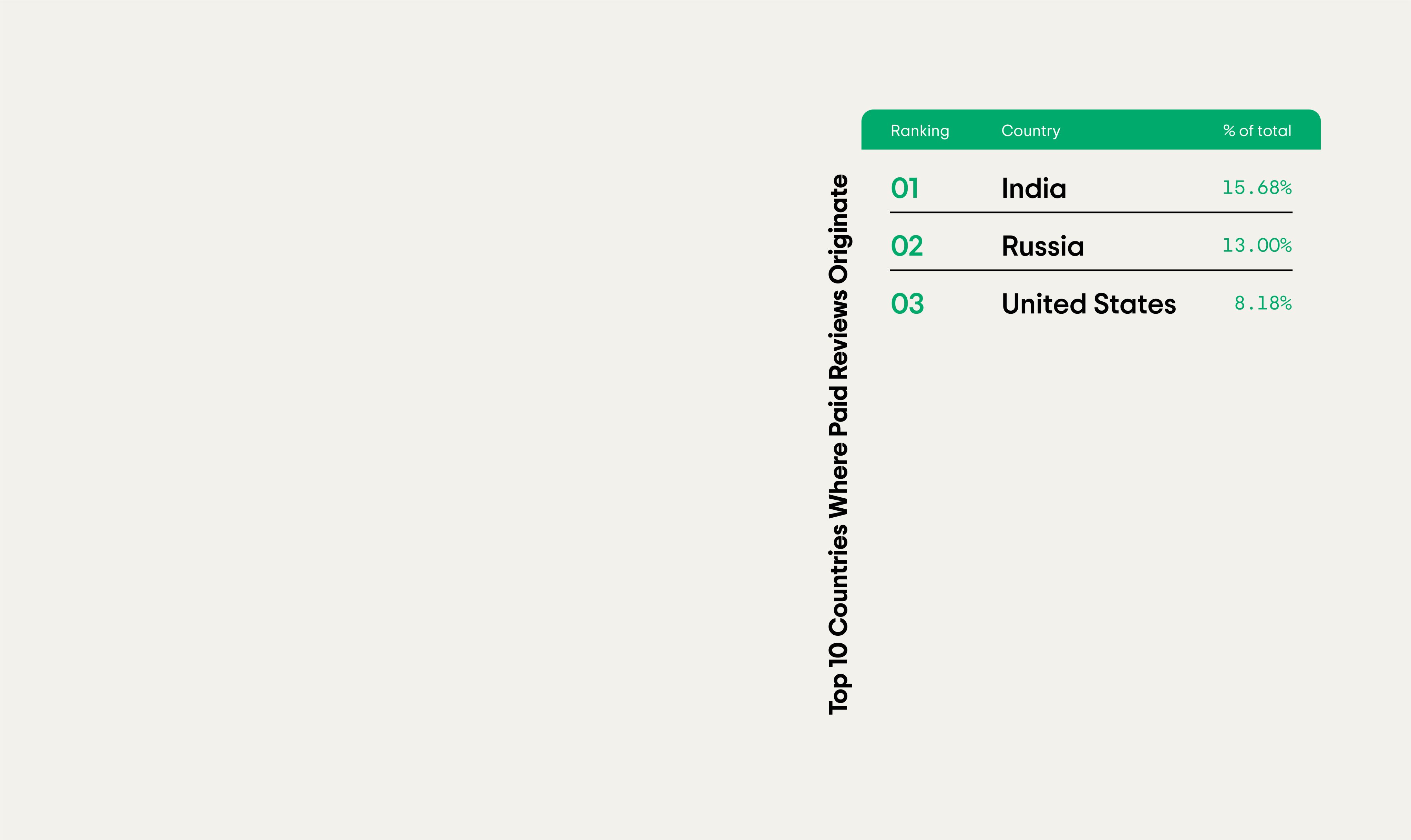
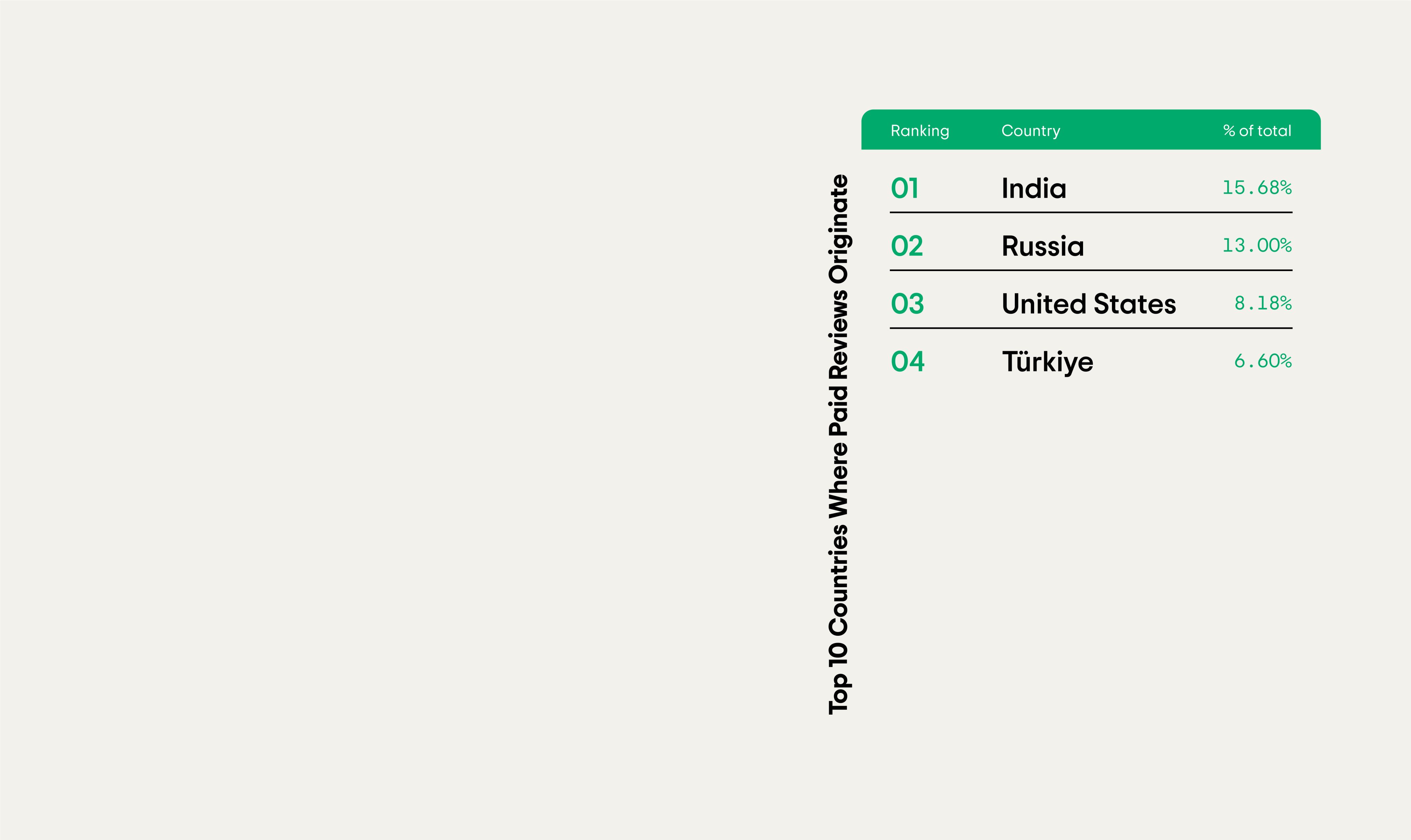
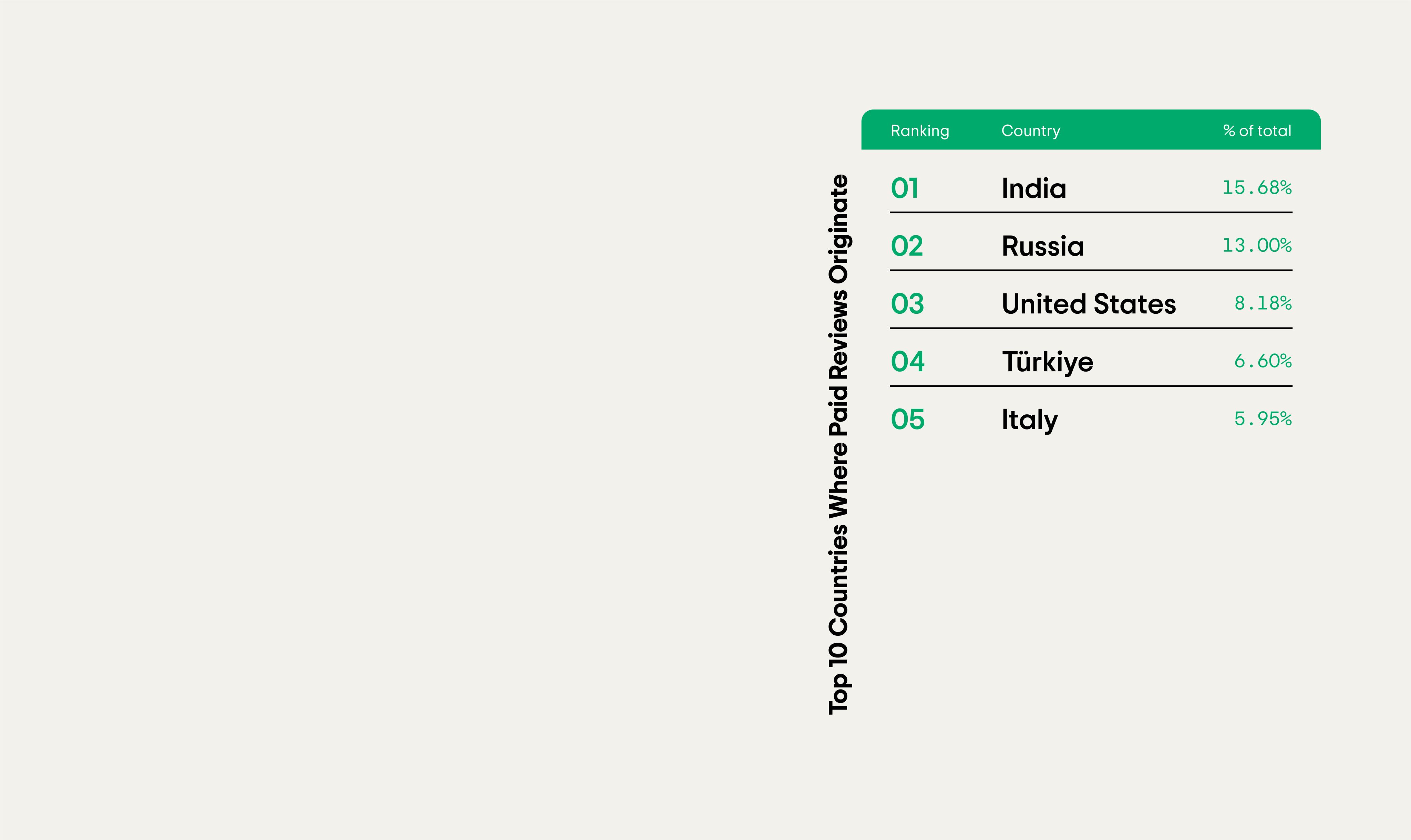
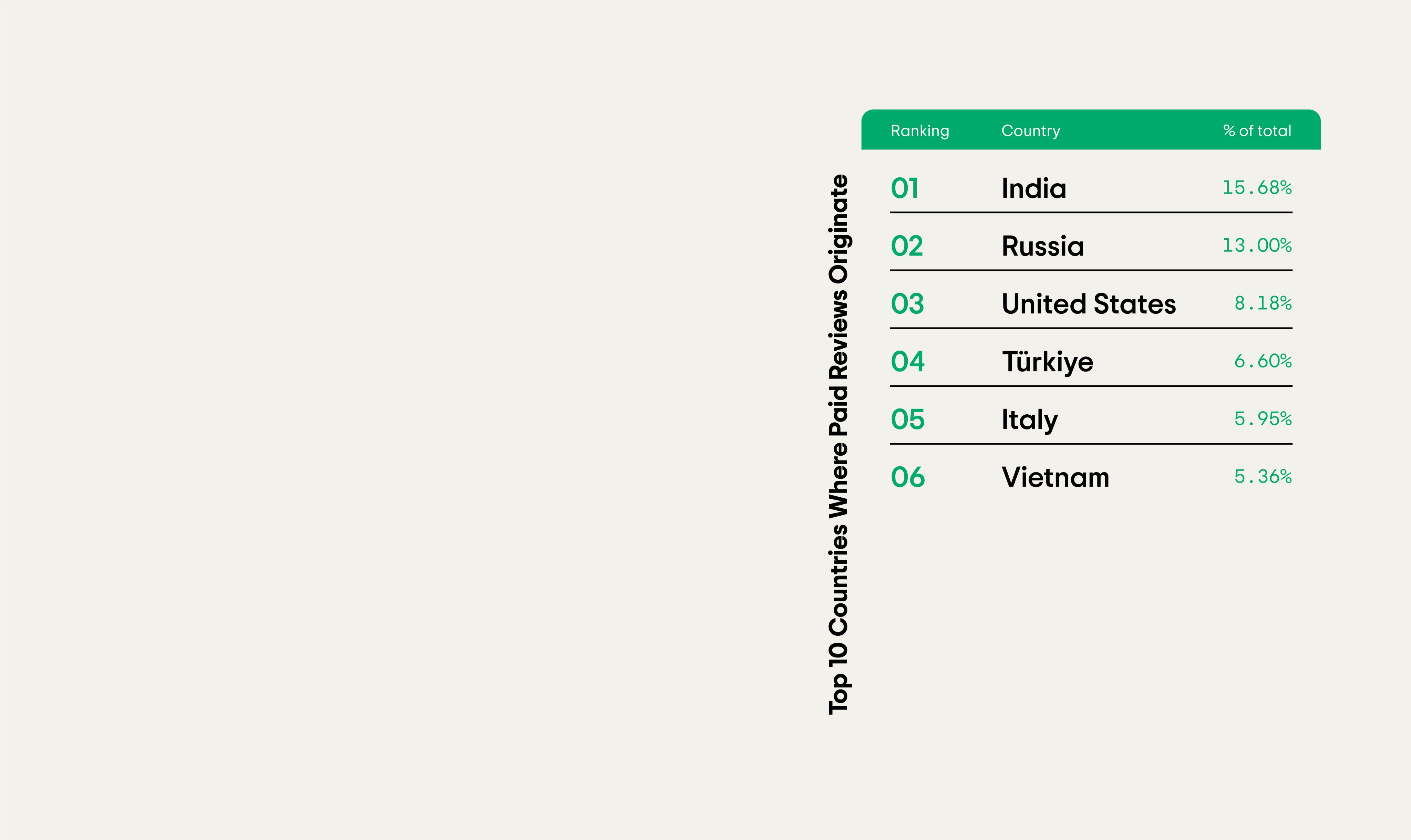
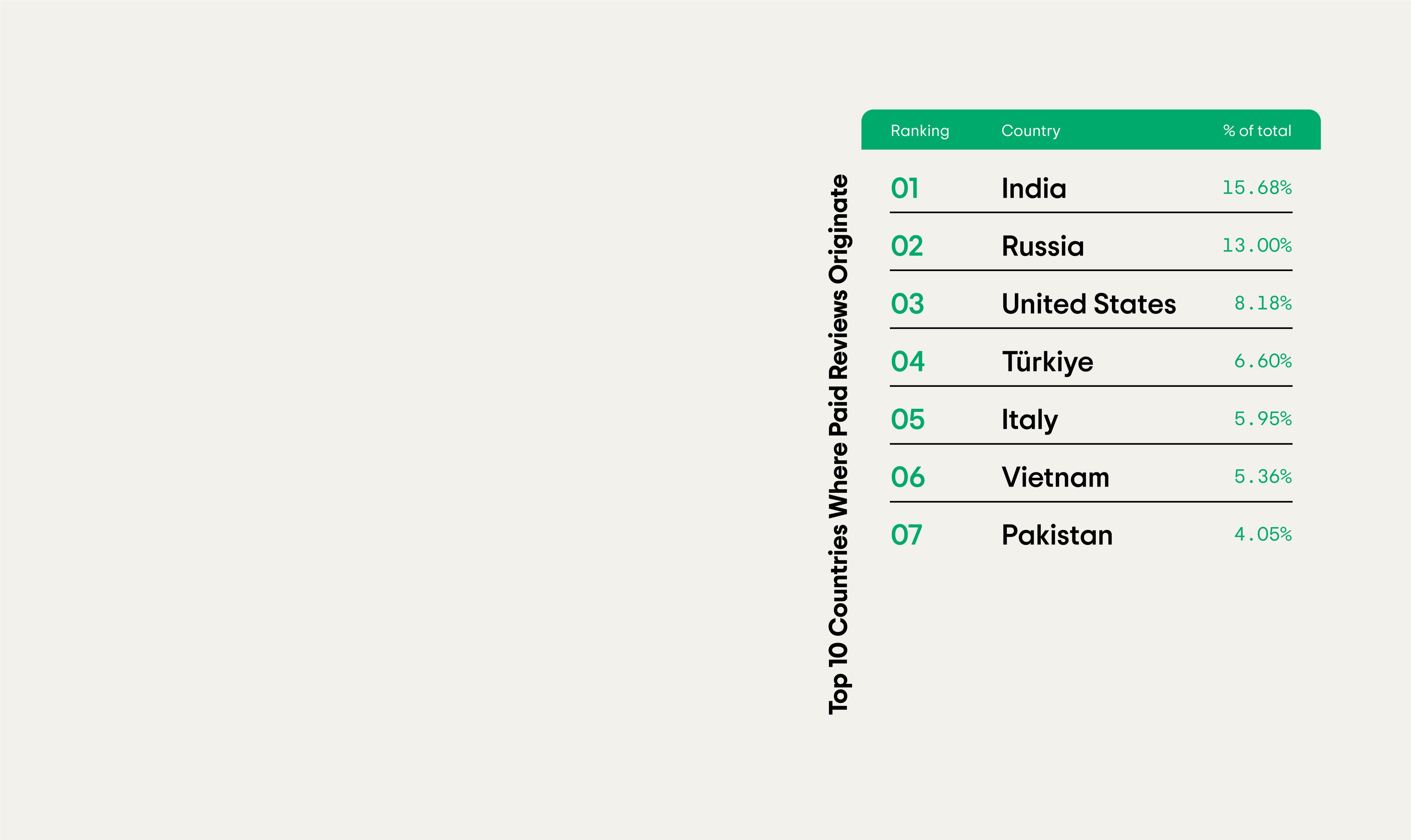
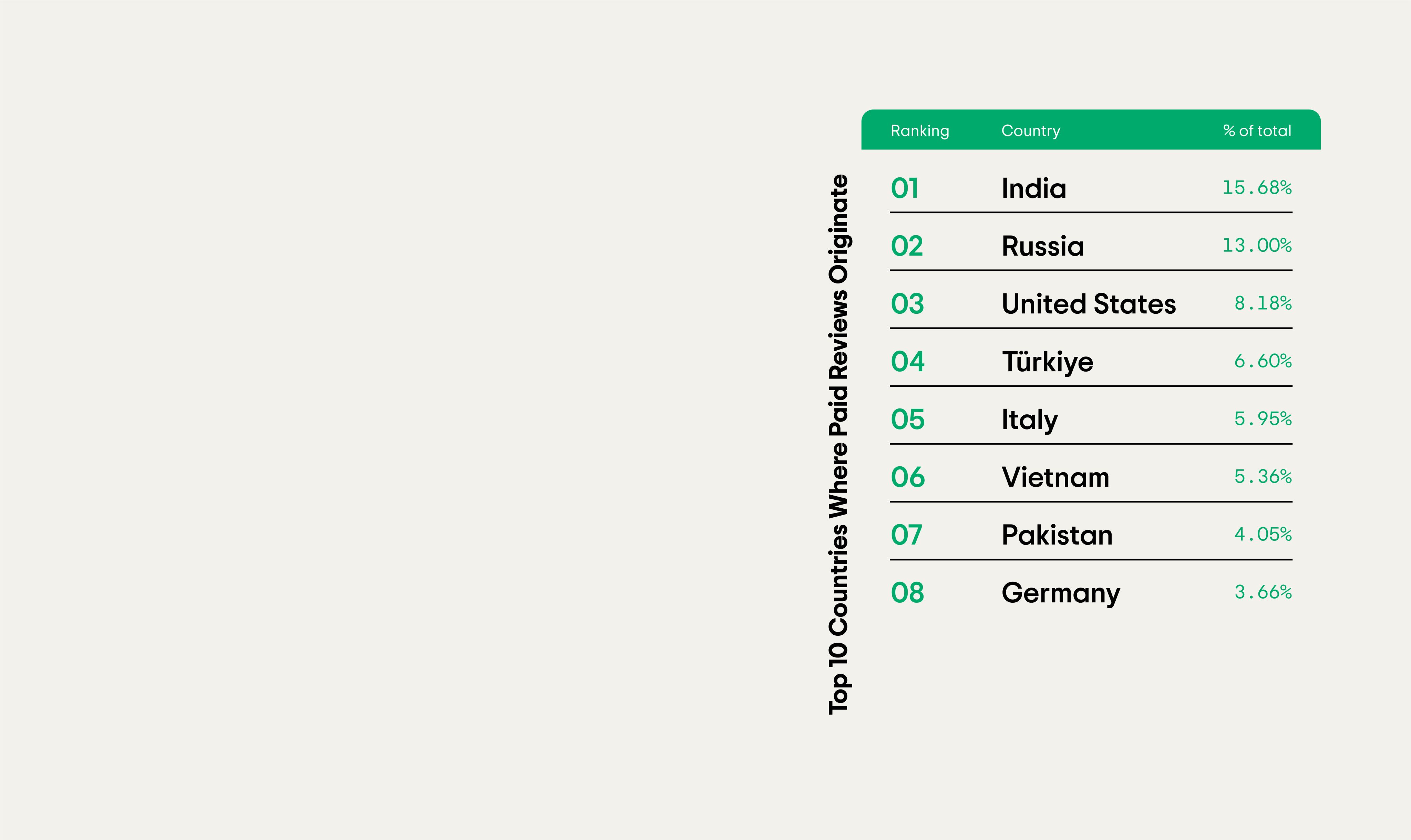
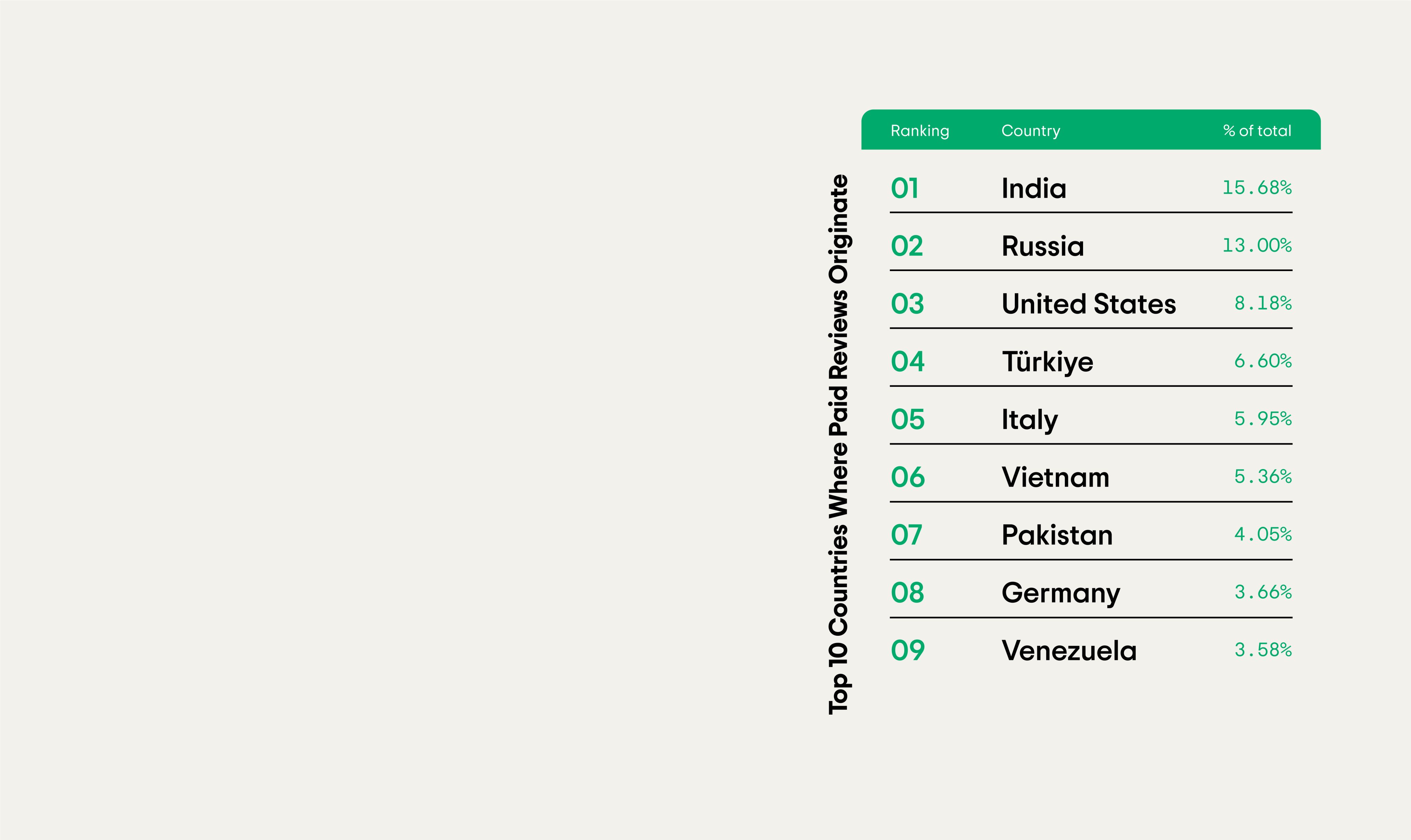
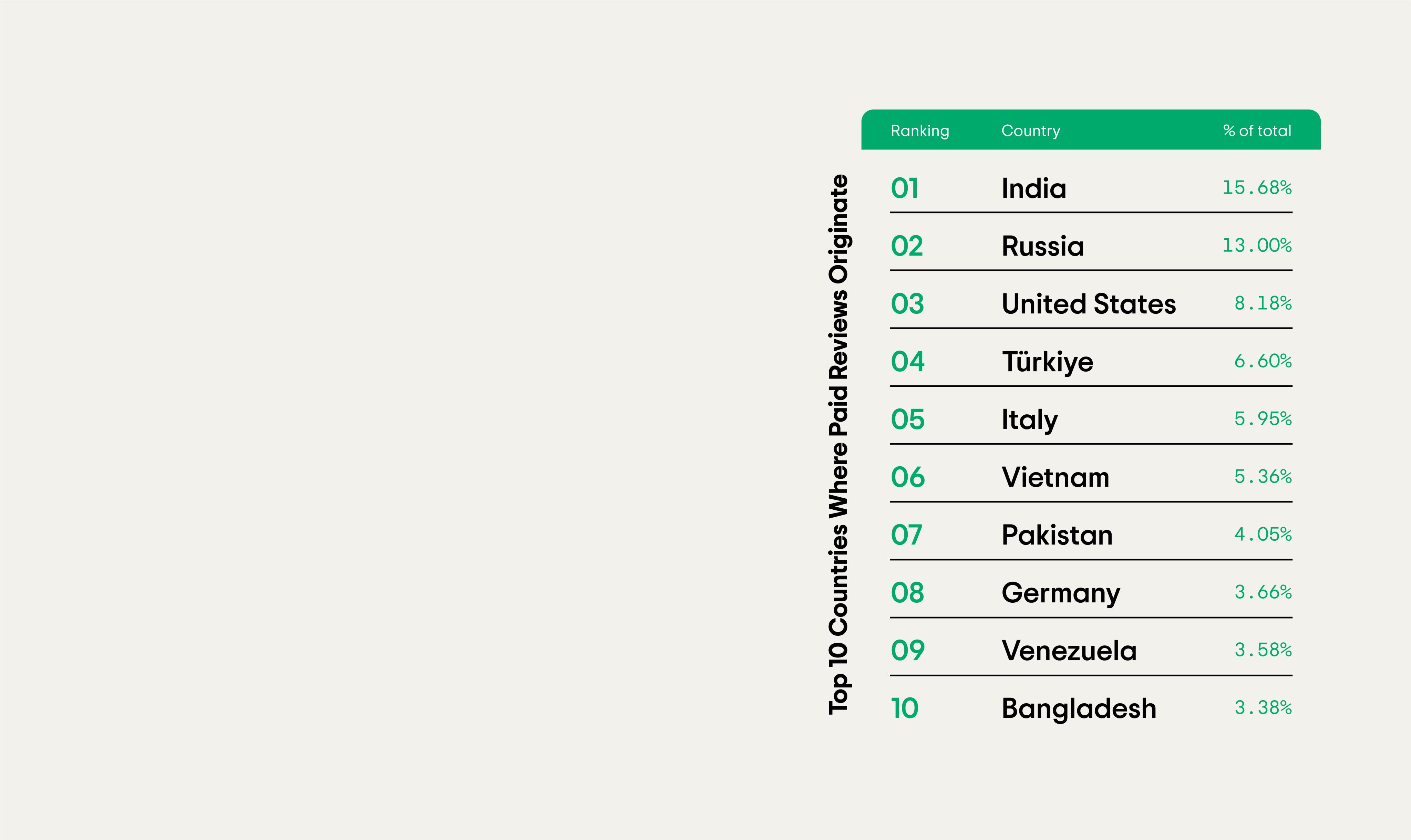
Spotting Fake or Paid Reviews
Staying ahead of paid reviews is serious business, and it’s necessary to support the vast majority of honest travelers, diners, and business owners on the platform. But when these reviews do infiltrate the system, Tripadvisor is ready to respond.
Due to a diligent, layered approach to moderation, the vast majority of fake reviews never make it to the platform. Tripadvisor’s fraud detection technology and expert investigative teams incorporate proactive techniques from the banking and credit card industry to map hundreds of discrete pieces of information, designed to detect the review’s origin and context or to spot a potential connection to other reviews or reviewer accounts. This includes establishing patterns of suspicious behavior from paid review operations as well.
Efforts to identify and eliminate fake reviews submitted to Tripadvisor continue to advance. In 2022, fake reviews represented 4.37% of all submissions versus 3.6% in 2020 and 2.4% in 2018. Luckily, more are caught early: 72% were caught before they were posted, compared to 67.1% in 2020. In total, 1.3 million reviews were identified as fake in 2022, compared to 943,000 in 2020.
Paid Reviews
While paid reviews represent a small percent of overall fraud removed, they continue to be a priority for Tripadvisor because they have the very real capability to negatively impact consumer trust. In total, the platform received 24,521 reviews associated with paid review companies in 2022. Nearly half of these originated from just six countries: India, Russia, U.S., Türkiye, Italy, and Vietnam.
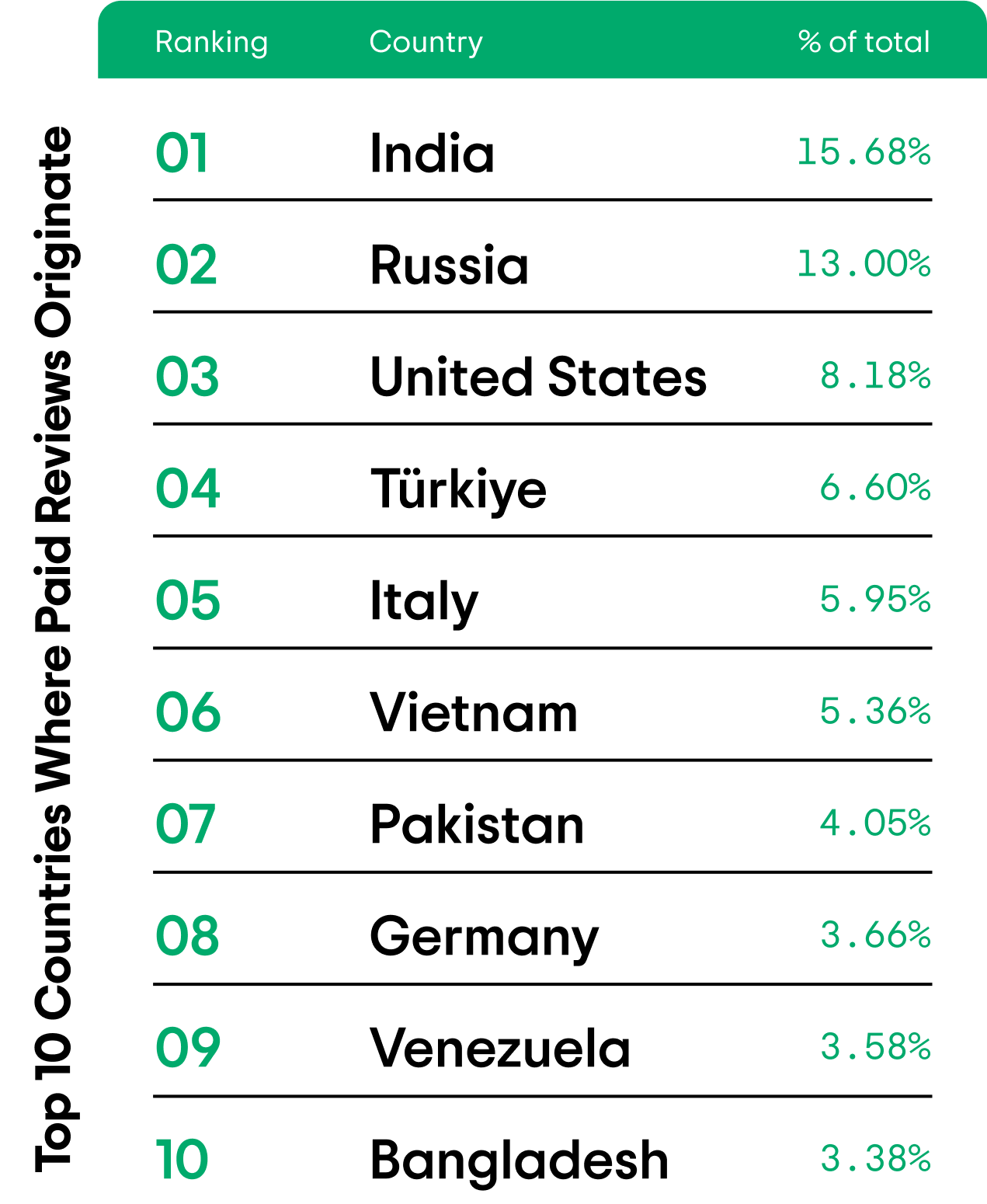
Upholding Community Standards
Once fraud is identified, there are a range of potential penalties, depending on the severity and longevity of the activity.
A red badge is issued in the most severe cases, usually involving repeated attempts by a business to unfairly manipulate reviews of a property or properties. Tripadvisor instituted 341 red badge warnings in 2022, enforced with a ranking penalty.
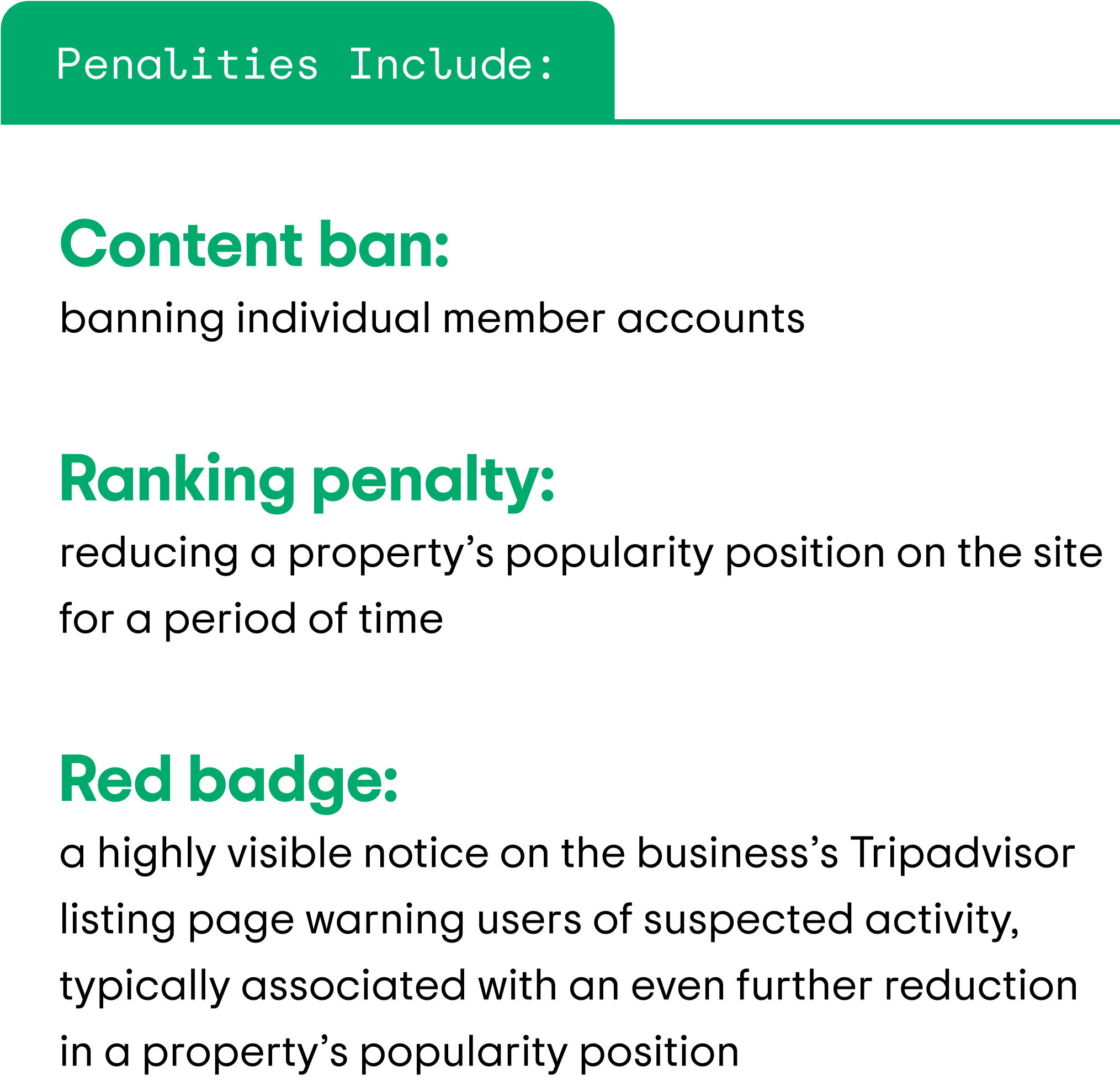

Several world events contributed to fraudulent and paid review activity during 2022, leading to an increase in rejected submissions. With mass travel comes fraud; this became clear to Tripadvisor after monitoring the 2018 FIFA Men’s World Cup in Russia and the 2019 FIFA Women’s World Cup in France.
Whenever many people travel to one place for a large event, particularly a less popular tourist destination where most visitors do not speak the language—as was the case during the World Cup in Russia in 2018 and Qatar in 2021—there is a high potential for fraud. In less traveled destinations, there is increased opportunity for dishonest owners to attempt to manipulate the platform by trying to improve business rankings.
As a result, sites like Tripadvisor must be proactive during large events in less traveled markets, instead of simply being reactive to these kinds of submissions. For example, the platform implemented unprecedented degrees of scrutiny on what it assessed as high-risk submissions being made in Qatar over a month prior to the tournament’s start. Being prepped and ready made all the difference: In 2022, Tripadvisor received more content than had ever been submitted for Qatar, with an unprecedented amount of fraud, the vast majority of which was caught before it was posted.
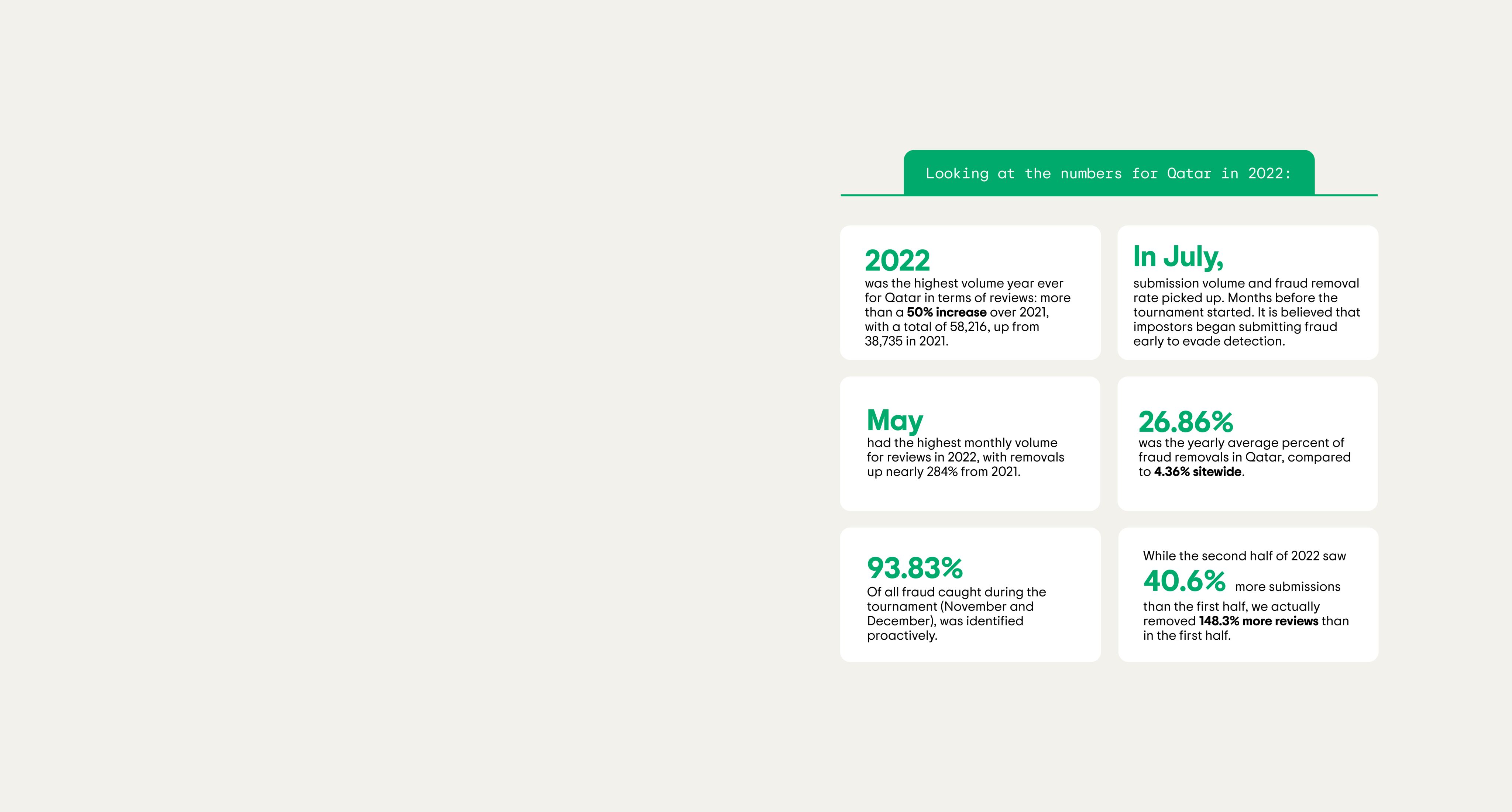

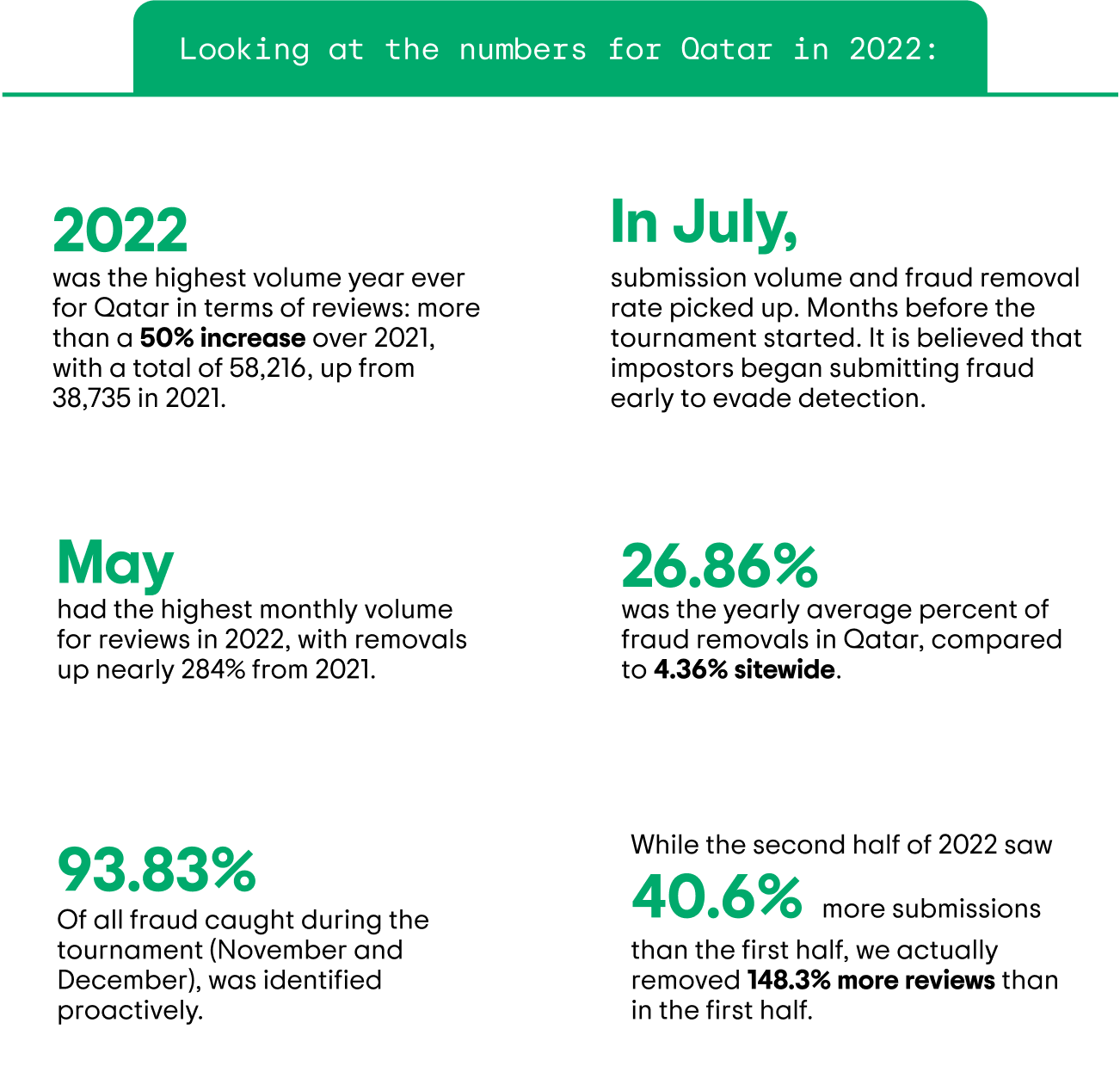
Several world events contributed to fraudulent and paid review activity during 2022, leading to an increase in rejected submissions. With mass travel comes fraud; this became clear to Tripadvisor after monitoring the 2018 FIFA Men’s World Cup in Russia and the 2019 FIFA Women’s World Cup in France.
Whenever many people travel to one place for a large event, particularly a less popular tourist destination where most visitors do not speak the language—as was the case during the World Cup in Russia in 2018 and Qatar in 2021—there is a high potential for fraud. In less traveled destinations, there is increased opportunity for dishonest owners to attempt to manipulate the platform by trying to improve business rankings.
As a result, sites like Tripadvisor must be proactive during large events in less traveled markets, instead of simply being reactive to these kinds of submissions. For example, the platform implemented unprecedented degrees of scrutiny on what it assessed as high-risk submissions being made in Qatar over a month prior to the tournament’s start. Being prepped and ready made all the difference: In 2022, Tripadvisor received more content than had ever been submitted for Qatar, with an unprecedented amount of fraud, the vast majority of which was caught before it was posted.
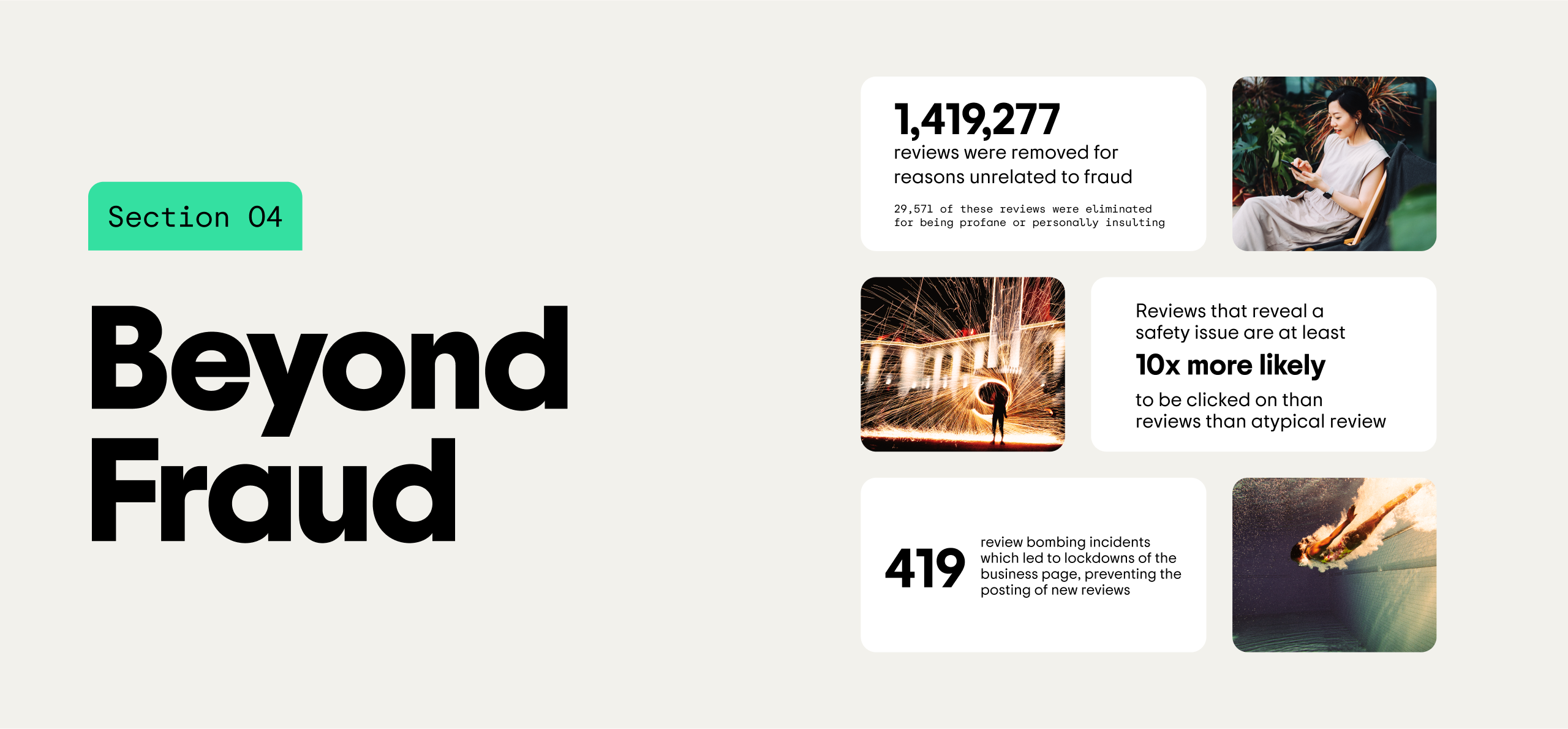
Reasons for Removing Posts After Moderation
Tripadvisor’s powerful moderation procedures do more than spot fake or boosting reviews. While the majority of these removals result from technical issues, such as excessively repeated characters or duplications, occasionally more harmful breaches of Tripadvisor’s community guidelines are identified.
Profane/vulgar and personally insulting language are among the top 10 reasons for removing posts after moderation (auto or manual). The inclusion of this type of content resulted in the elimination of 29,571 reviews during 2022.
Top 10 Reasons for Removing Posts Other Than Fraud
(see our Community Guidelines)
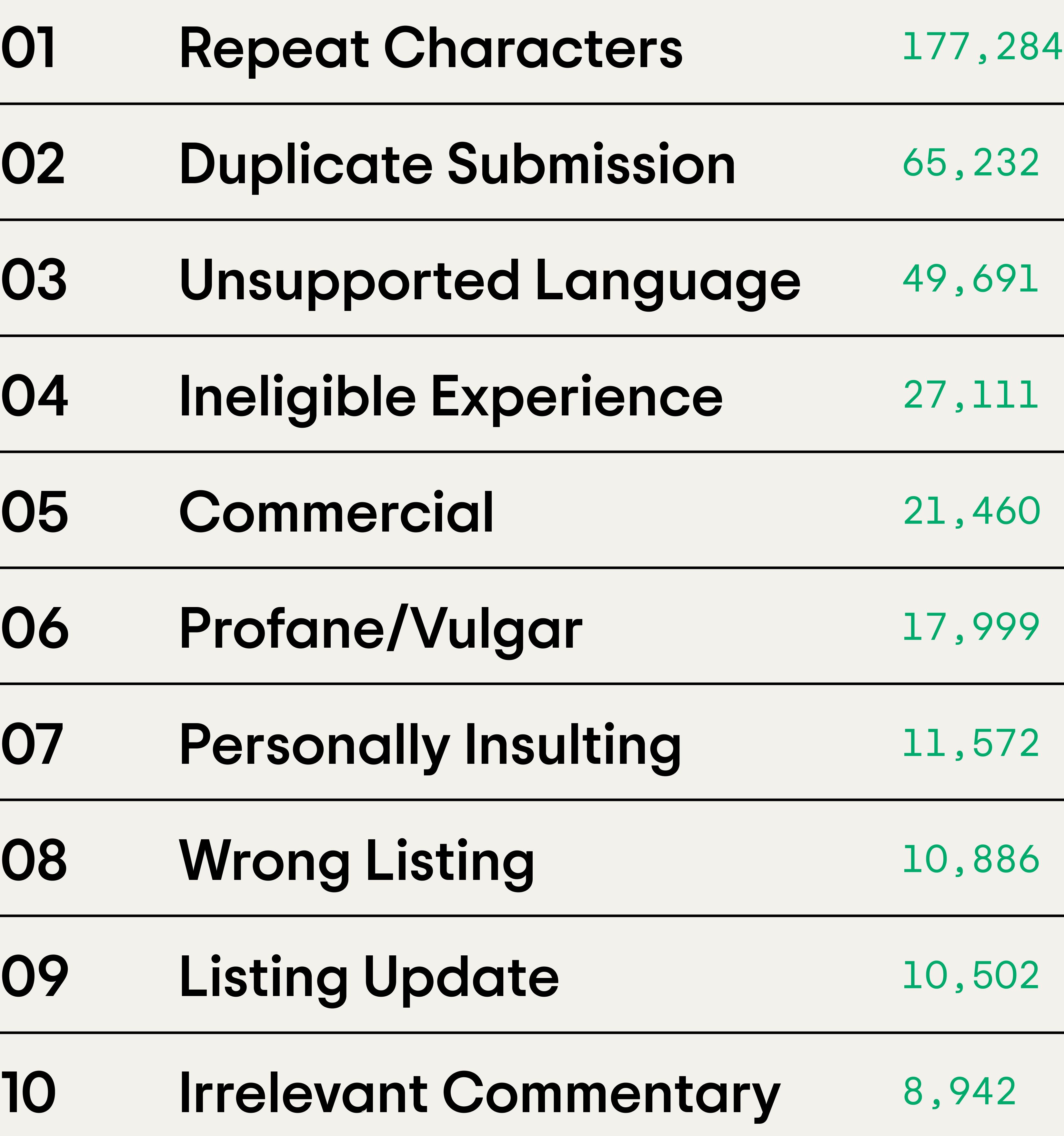
Keeping Travelers Safe
Safety alerts and serious allegations, including sexual assault, death, drugging, or other serious incidents, are also a focus of Tripadvisor’s detection system. Any listing associated with a serious safety issue, described within a traveler review and identified by Tripadvisor, is subject to additional measures to increase that review’s visibility to travelers.
In such cases, Tripadvisor places an additional filter on the business, helping users more easily identify potentially problematic listings and quickly locate any content related to a safety concern. This type of content will also be highlighted to users via an alert, visible within the review itself. In 2022, there were 597 reviews posted describing a serious safety incident during a travel or dining experience.
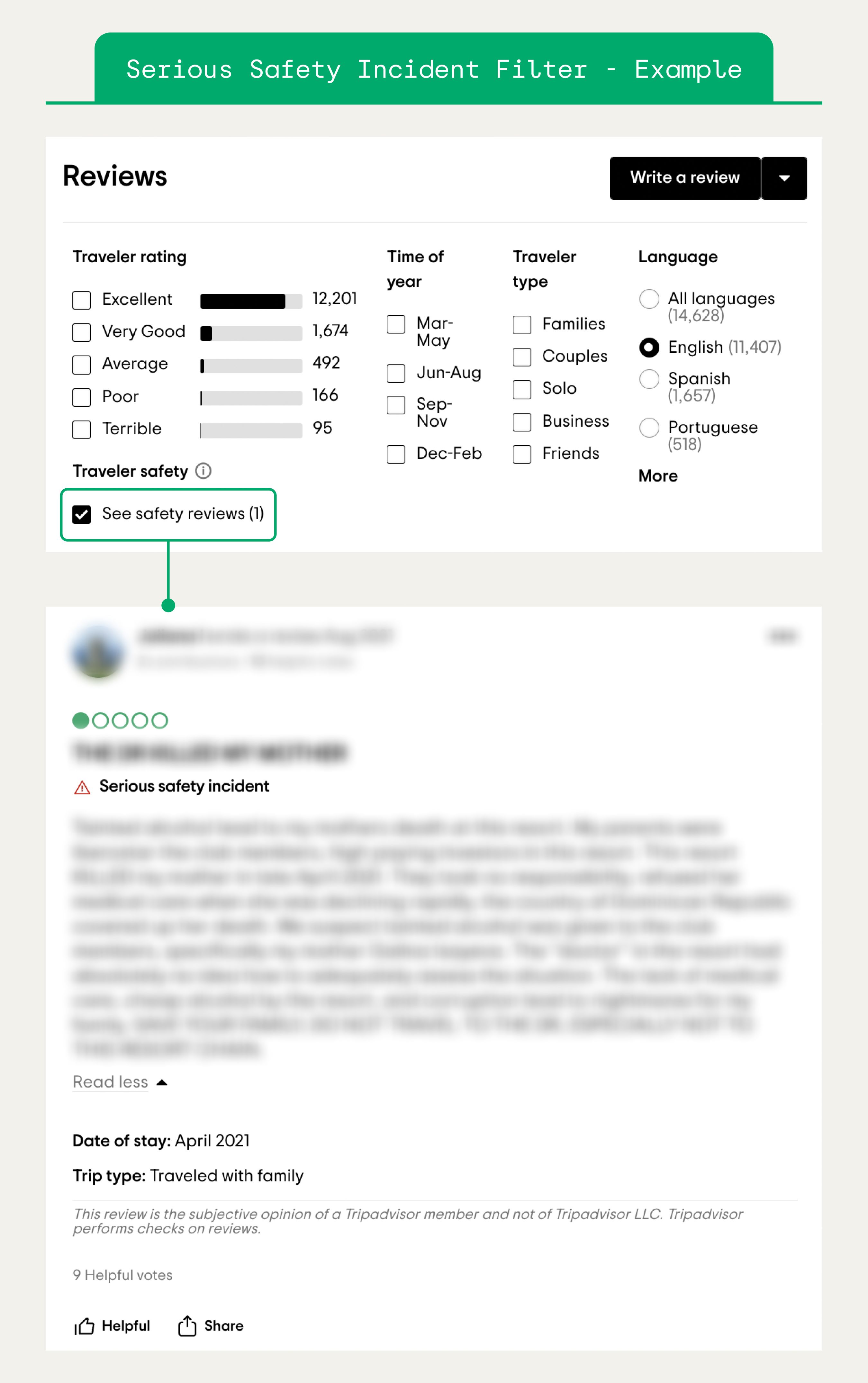
Tripadvisor’s system to protect travelers by making such content easy to find is clearly working.
Reviews that reveal a serious safety incident are at least 10 times more likely to be clicked on than reviews that do not describe a safety incident.
Safety Issues Reported
by Business Type

Review Bombing
Review bombing is a serious issue that also requires immediate action by Tripadvisor moderators.
When a high-profile incident, such as political activity or protests, goes “viral” or garners news media attention, there is often an influx of review submissions for businesses that may be associated. Most of the reviews following these incidents do not describe a firsthand customer experience and therefore do not comply with Tripadvisor’s community standards. In these situations, Tripadvisor posts a lockdown notice on the business.
A lockdown notice alerts our users to the fact that Tripadvisor has stopped posting any new content for that business for a set period of time, helping to maintain integrity of the platform and prevent submissions that would detract from the genuine, firsthand accounts expected from the Tripadvisor community.
Review bombing incidents saw a significant jump in 2022, with 419 properties locked down, up almost 30% compared to 2020. This prevented 39,969 reviews from being posted to the site—nearly four times the number prevented due to lockdowns in 2020. The war in Ukraine was a major driver of this activity, with large numbers of international reviewers attempting to post non-firsthand commentary.

Tripadvisor is committed to maintaining a safe, responsible, and useful platform for all members, partners, travelers, and diners. To uphold the integrity of the platform and remain transparent in its efforts, Tripadvisor has prioritized the following three initiatives:
1. Improving and increasing detection of incentivized reviews
We believe there is no place on our site for reviews that have been incentivized by businesses listed on Tripadvisor. We define these reviews as ones that were submitted due to an offer made by a business listed on our site in exchange for something—either an actual, concrete benefit, like a free drink or a discount on a hotel room, or the potential for a benefit, like an entry into a contest or raffle. We believe that when businesses make offers like this, they result in low-quality, unreliable content that doesn’t serve the best interest of travelers and diners.
This includes a subset of incentivized reviews we refer to as “employee incentives,” in which the freebies or bonuses in question are awarded not to guests, but to employees, often in exchange for garnering a certain number of reviews a month, or for being mentioned in reviews by name. In our experience, these programs inevitably result in low-quality content and are frequently gamed by the same employees who stand to benefit from them.
To report known or suspected offers of incentives, which can be either guest-facing or employee incentives, please contact us at incentives@tripadvisor.com.
2. Exploring the impact of new technologies on our platform
As a pioneer in the online space, Tripadvisor is used to exploring new technologies and tools, particularly those that have the power to solve real world problems for consumers. One such development is the arrival of OpenAI’s ChatGPT tool, which has garnered a considerable amount of attention since its launch in late 2022.
Generative AI powered technologies, such as ChatGPT, have the power to drive innovation and product development for platforms like Tripadvisor, from the way we curate and personalize guidance content, to tools that will help our community share more helpful reviews and opinions.
As with all new technologies, the benefits of generative AI also come with challenges, and we expect to see attempts from businesses and individuals to use tools like ChatGPT to manipulate content on Tripadvisor. Our Trust & Safety team will continue to monitor the use of these tools on the platform and will take all available steps to stay ahead of threats to Tripadvisor’s brand integrity.
3. Working with our community and industry partners
Tripadvisor has successfully maintained and protected the platform it built to serve the travel community, both businesses and consumers, for more than two decades. This success relies on cooperation with a wide range of stakeholders—from the passionate community members who flag suspicious content, to the regulators and law enforcement agencies that help identify and prosecute fraudsters.
Outside of our direct community, Tripadvisor also seeks cooperation with industry associations, social media, and other review platforms. In late 2022, Tripadvisor brought together representatives from leading online review platforms for a closed-door conference in San Francisco. This first-of-its-kind meeting aimed to start a dialogue around how technology companies can work together to tackle fake content and create a safer and fairer online landscape for consumers.

The 2022 Transparency Report as well as previous Transparency Reports can all be found on Tripadvisor’s Trust & Safety site: https://www.tripadvisor.com/Trust
All review-related statistics are based on reviews submitted to Tripadvisor between (and inclusive of) January 1, 2022, and December 31, 2022, along with any further moderation actions that may have been taken on those reviews through January 31, 2023.
All references to 2018 and 2020 data are sourced from the 2019 and 2021 Review Transparency Reports, respectively. The metrics in the report focus on traveler review content only. Unless otherwise stated, the data does not cover other content types on the platform, such as management responses, forum posts, photos, videos, and Q&As. For example, if a photo submitted alongside a review was queued for manual moderation, the review would not be counted as manually moderated in this report because the issue was only with the photo, not the review. However, if the review was also flagged for manual moderation by the technology system or reported by the community, it would be included in the data in this report. The data collection methodology and its results have been vetted for accuracy and confirmed by multiple teams across Tripadvisor, including data analysts, review moderation managers, and fraud investigators. Every possible effort has been made to ensure the data in this report is accurate.
By the same token, there is always the potential for human error in human content moderation, particularly on complex decisions where there is a degree of subjectivity—such as whether a review includes offensive language, as some words and phrases may be offensive in some contexts and not in others. There is also the possibility for inaccuracies due to unforeseen technical errors, such as software bugs or tool outages, although given the scale of data included in the report and the rigor with which it has been analyzed, any impact on the figures included herein would be minimal.
For the data around clicks on a specific review, Tripadvisor reviews can be seen in the context of other reviews or seen on their own via a URL dedicated to that one review (although the property's overall rating, based on all the business's posted reviews, is always visible). This statistic refers to reviews seen directly via a dedicated URL.
As a global report, the metrics are presented in aggregate across all 28 languages that Tripadvisor supports globally. With English being the largest language by review volume, the aggregate metrics are most representative of English-language reviews. Data related to smaller-volume individual languages might experience deviations from the aggregate averages in areas such as processing times or removal rates. Occasionally, a review may be reported more than once. For example, multiple users could dispute a single review, or an owner could disagree with a decision to keep a review posted and may report the review a second time. For the purposes of this report, such a review is counted as “reported” only once. However, the measure for turnaround times considers all reports, whether it is the first report of the review or a duplicate.